As Maternal Health Crisis Worsens, Advocates Host a “Rally for Midwives” & Advocacy Day at State House to Call for Expanded Access to Midwifery Care
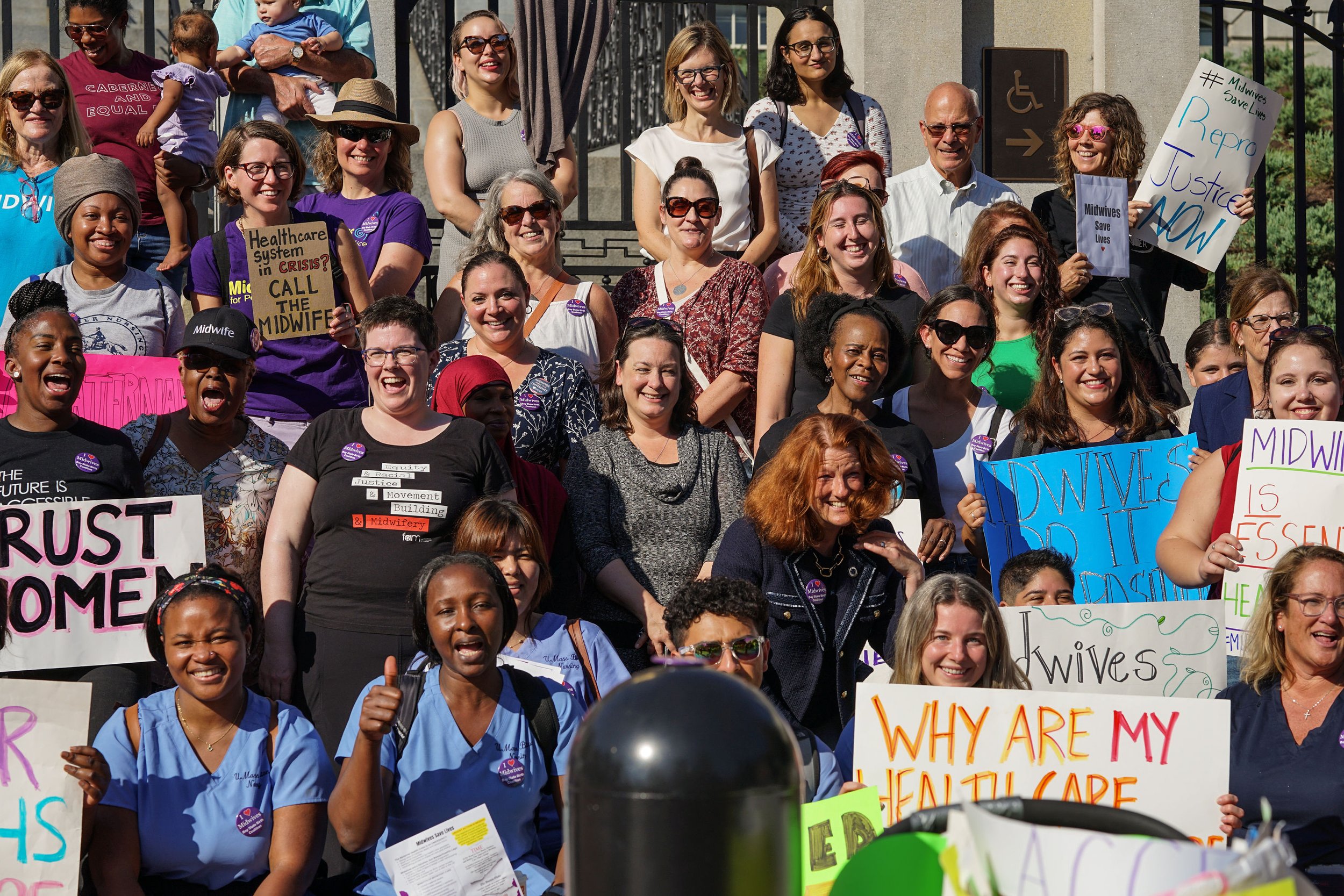
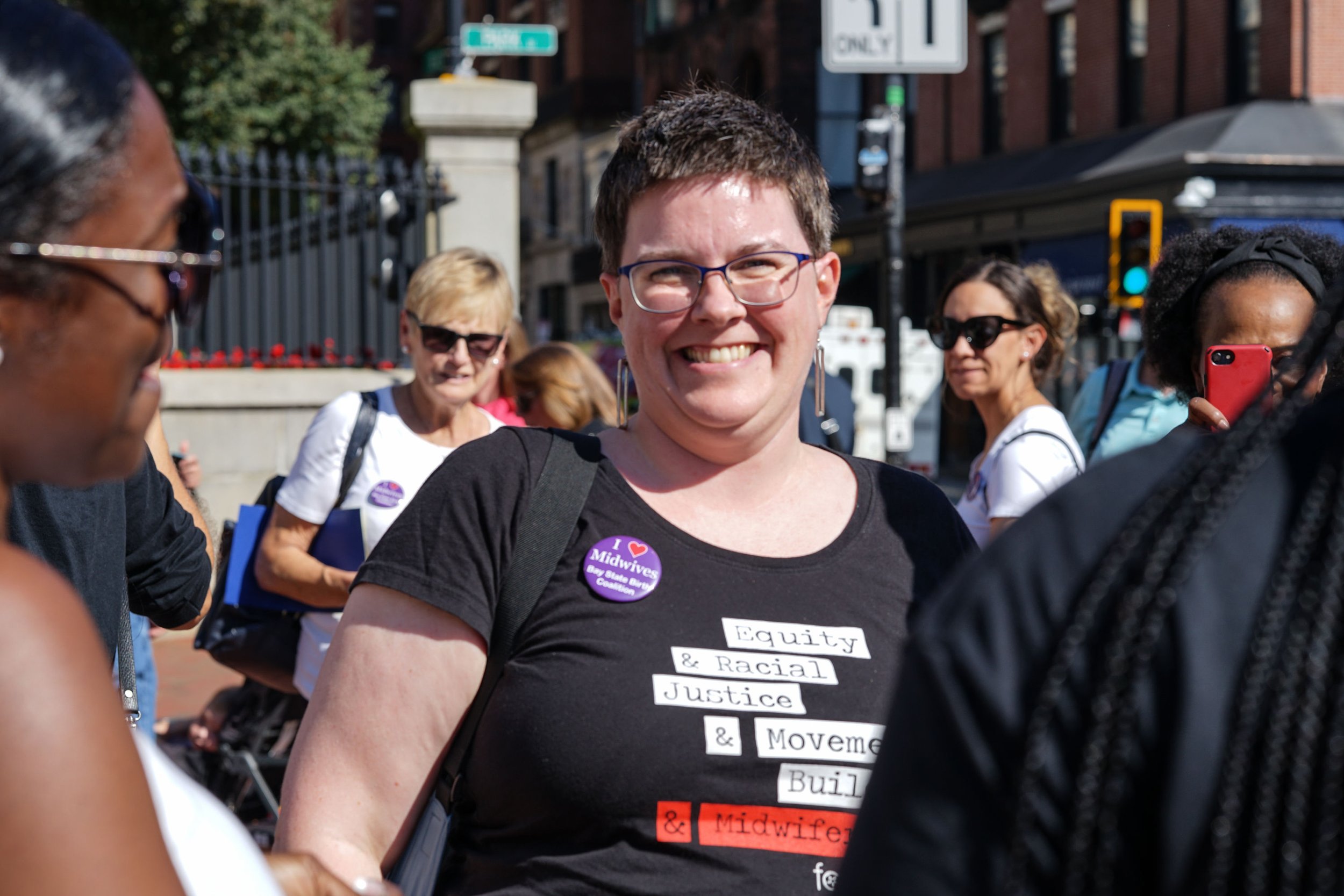
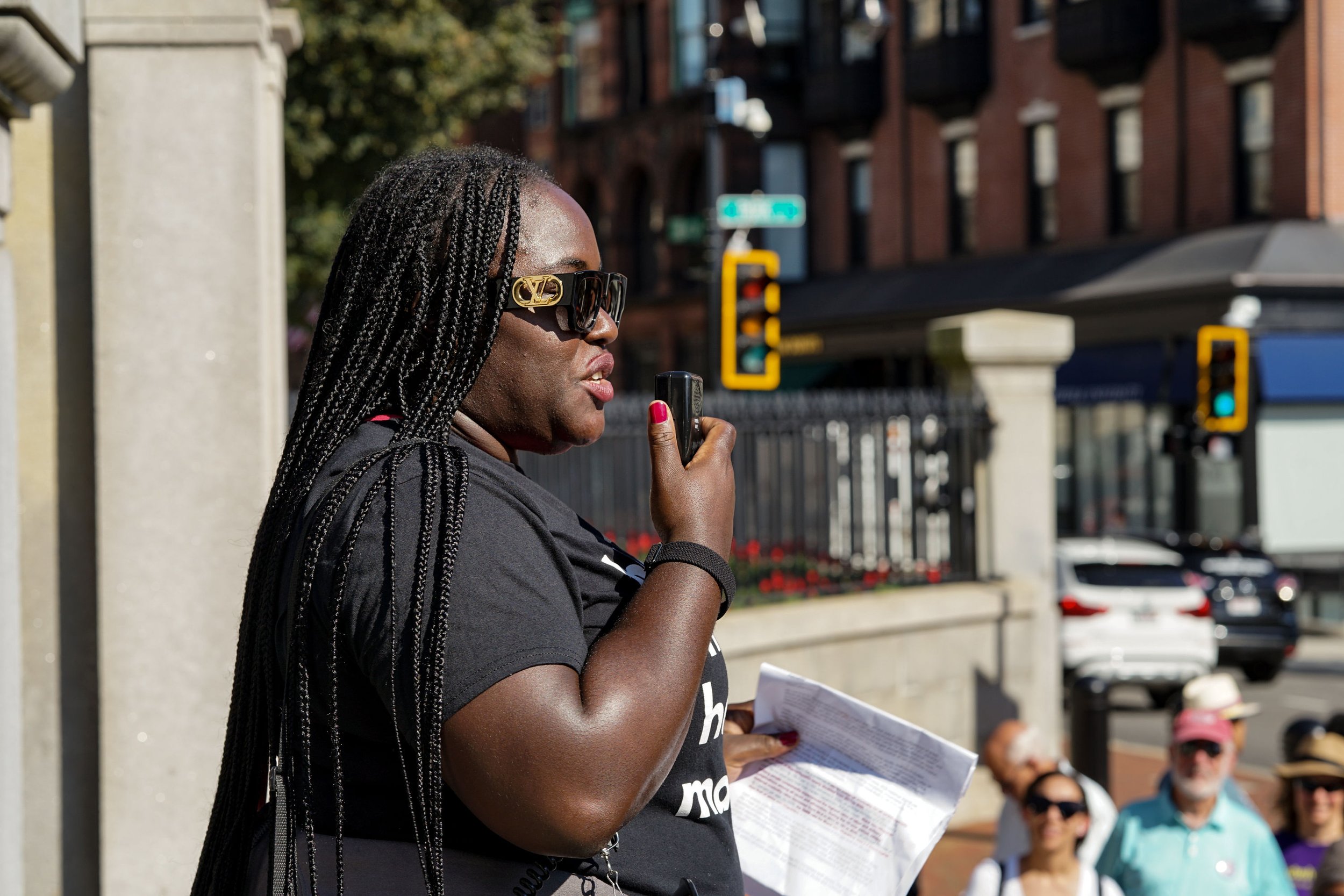
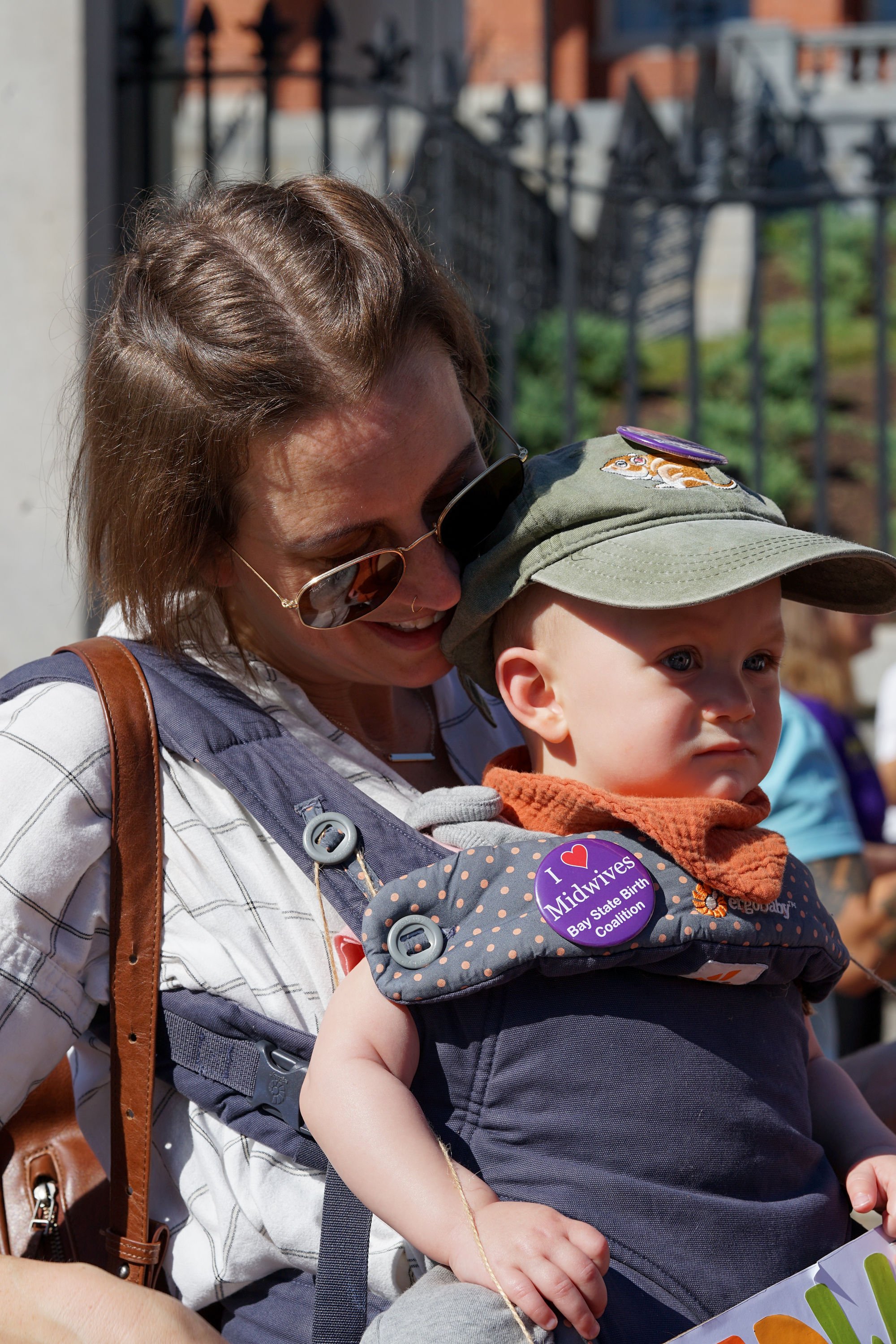
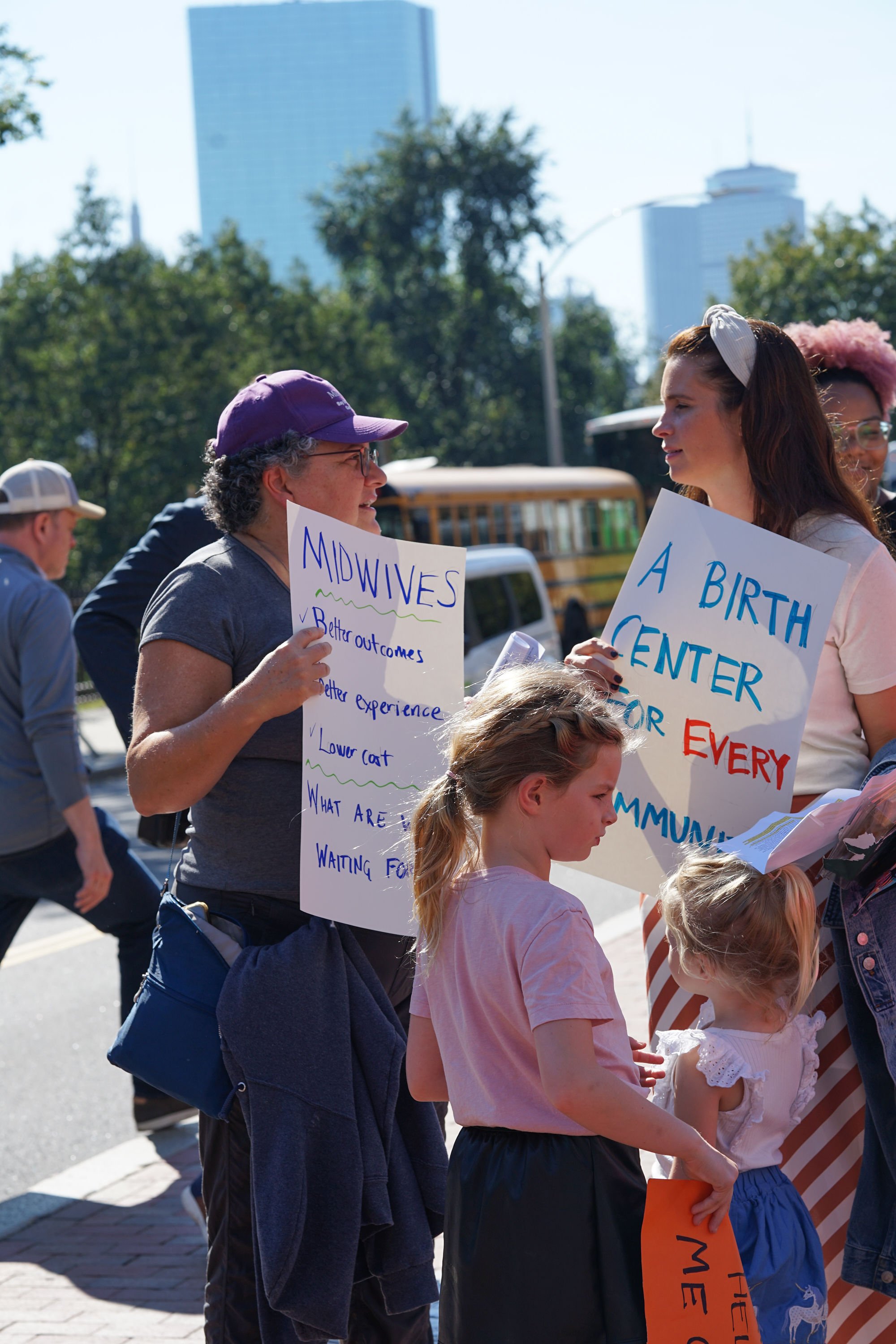
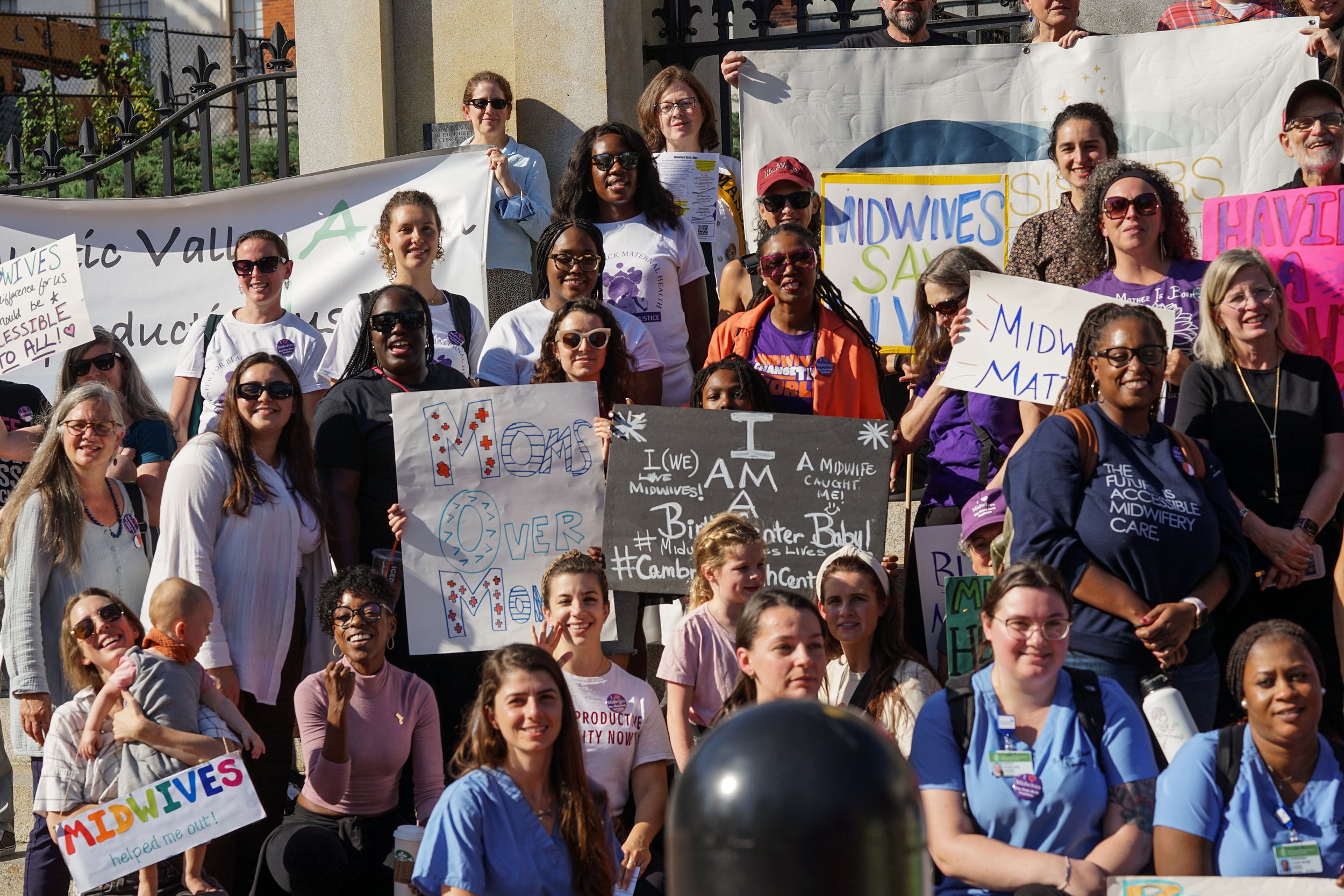
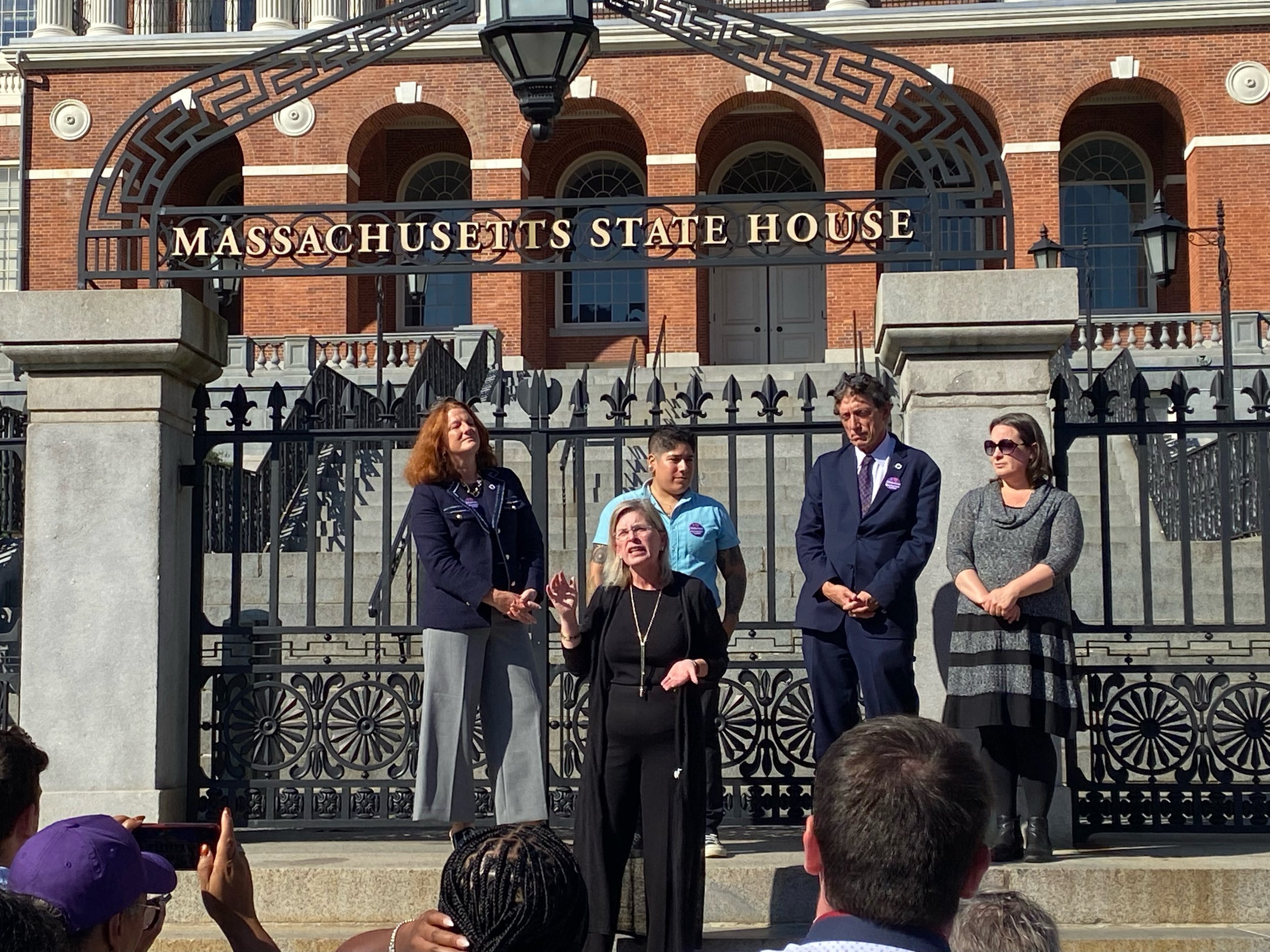
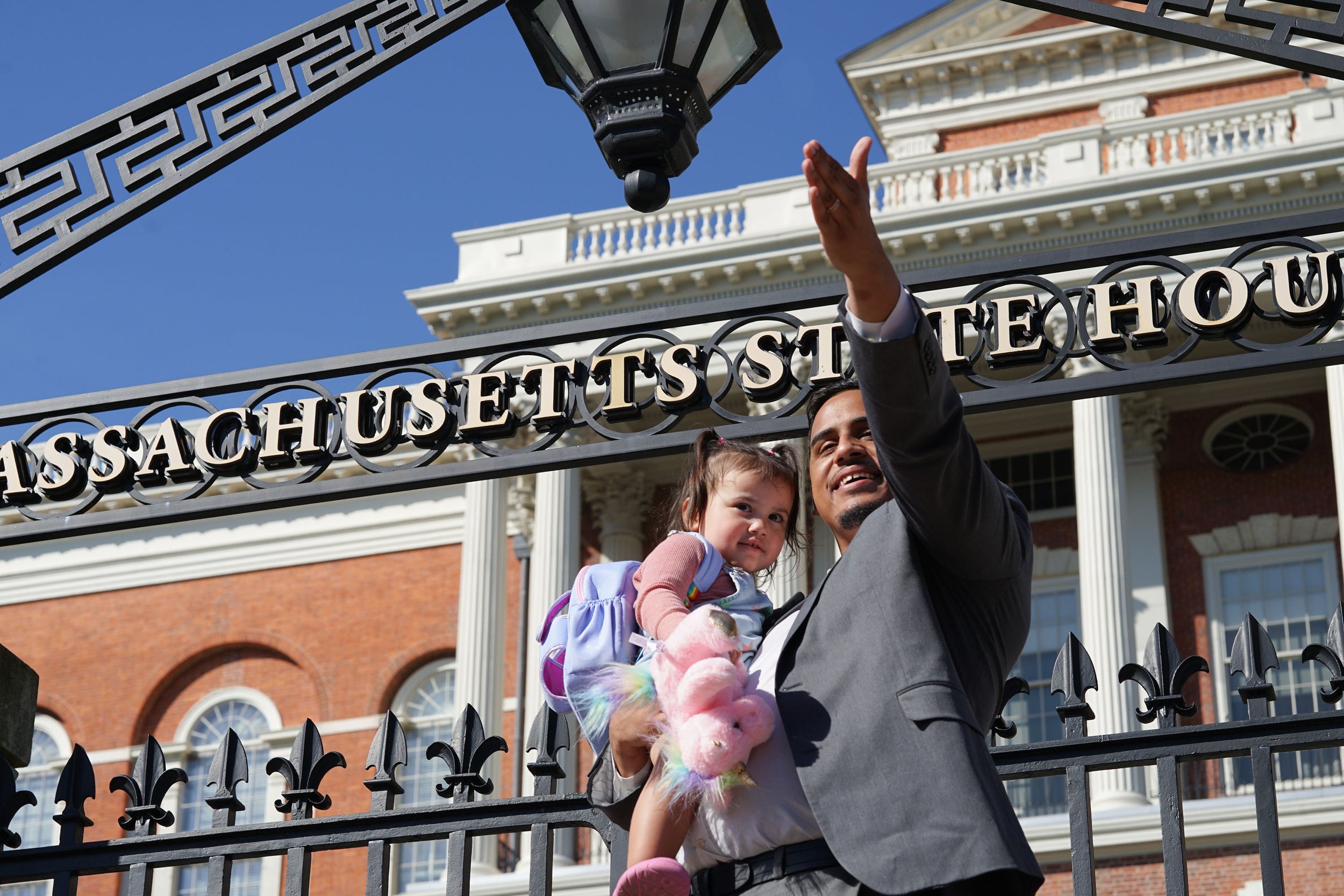
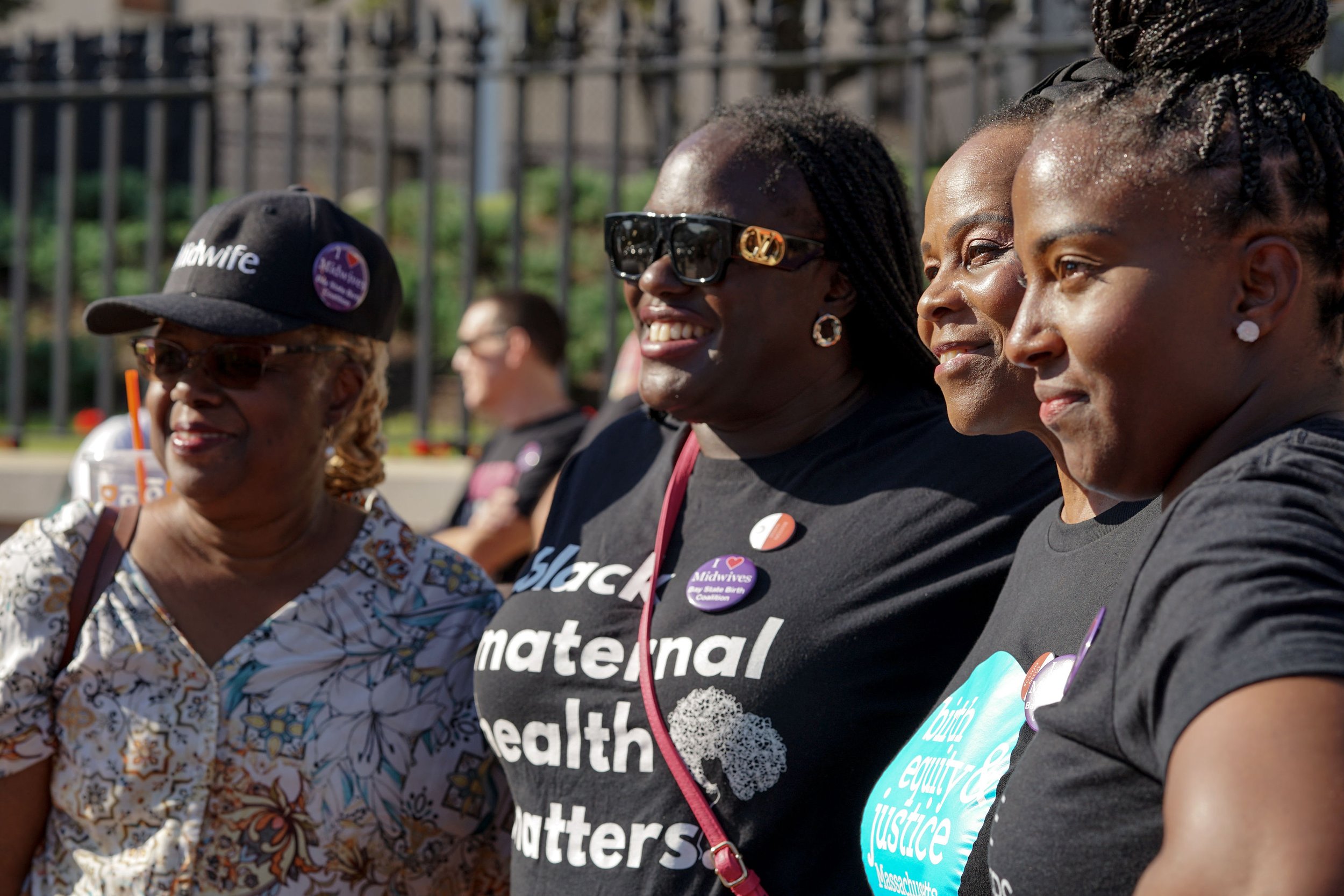
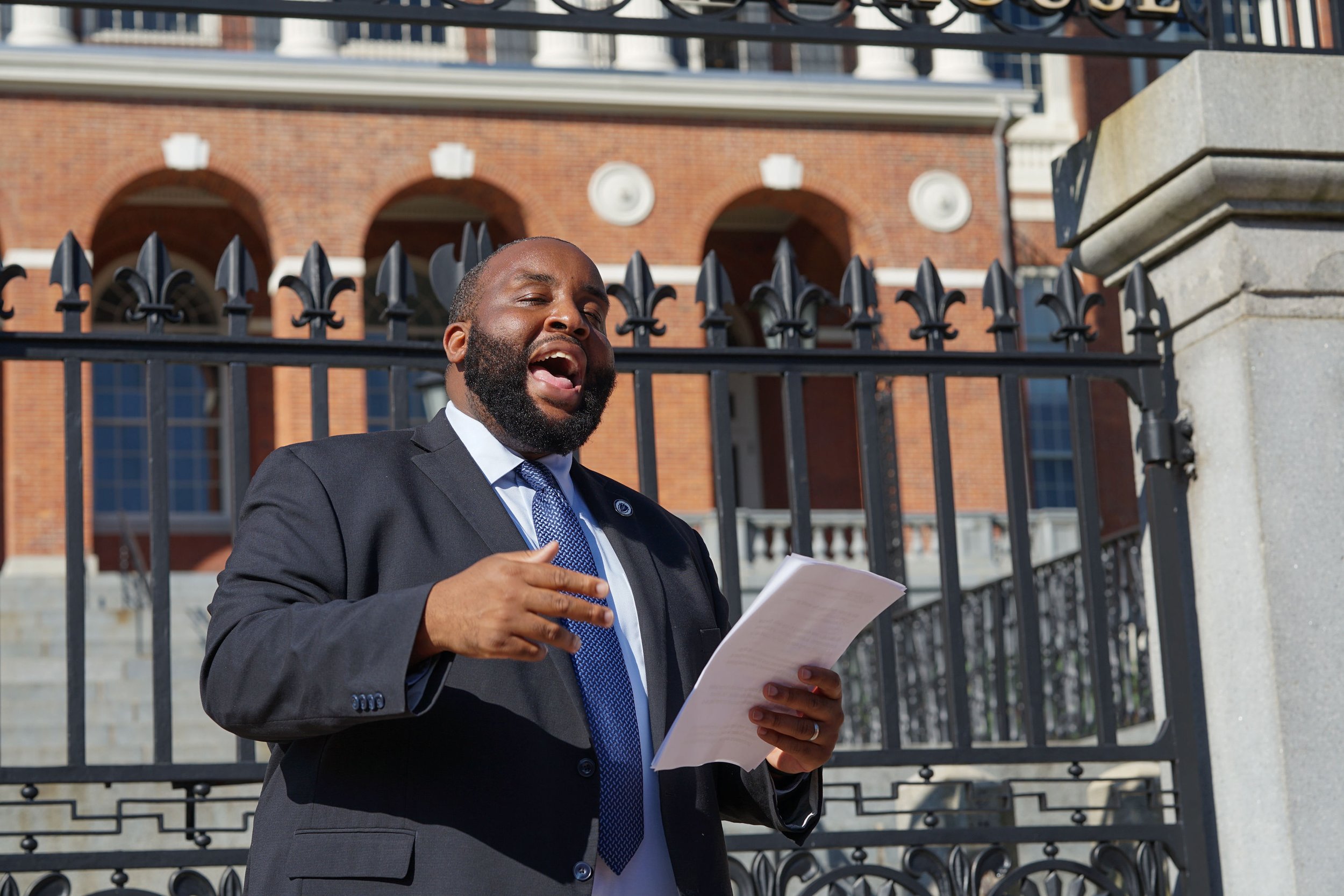
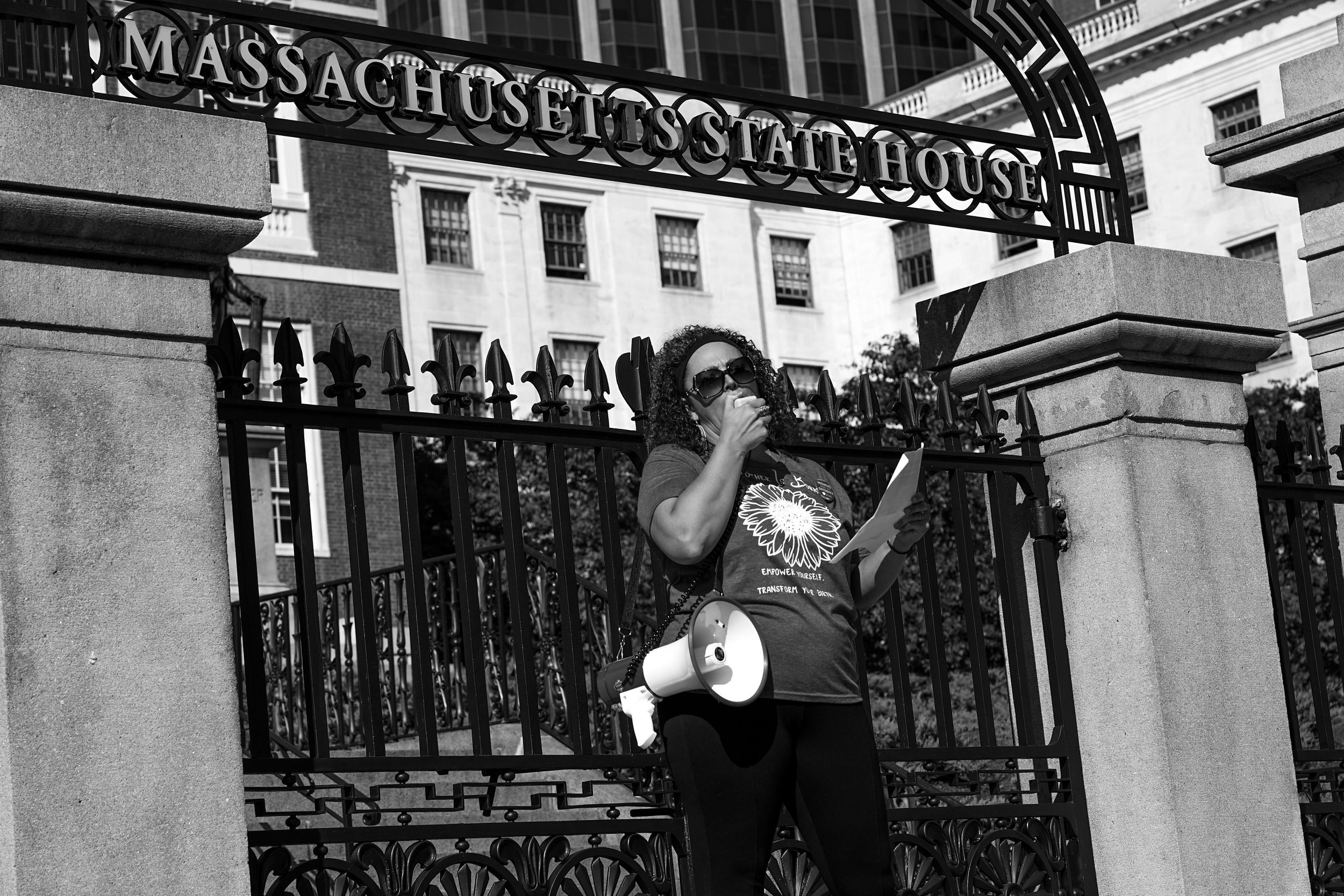

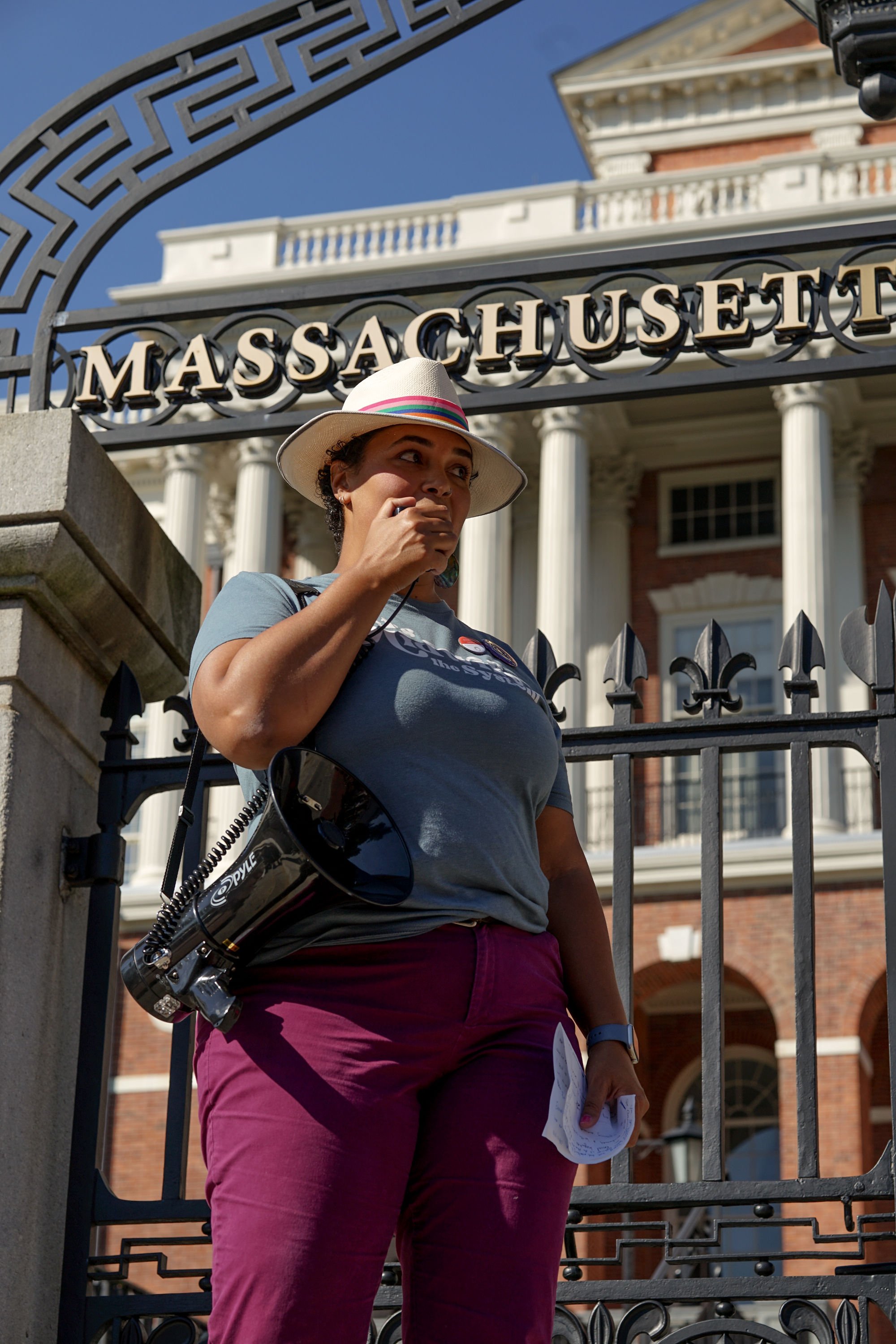
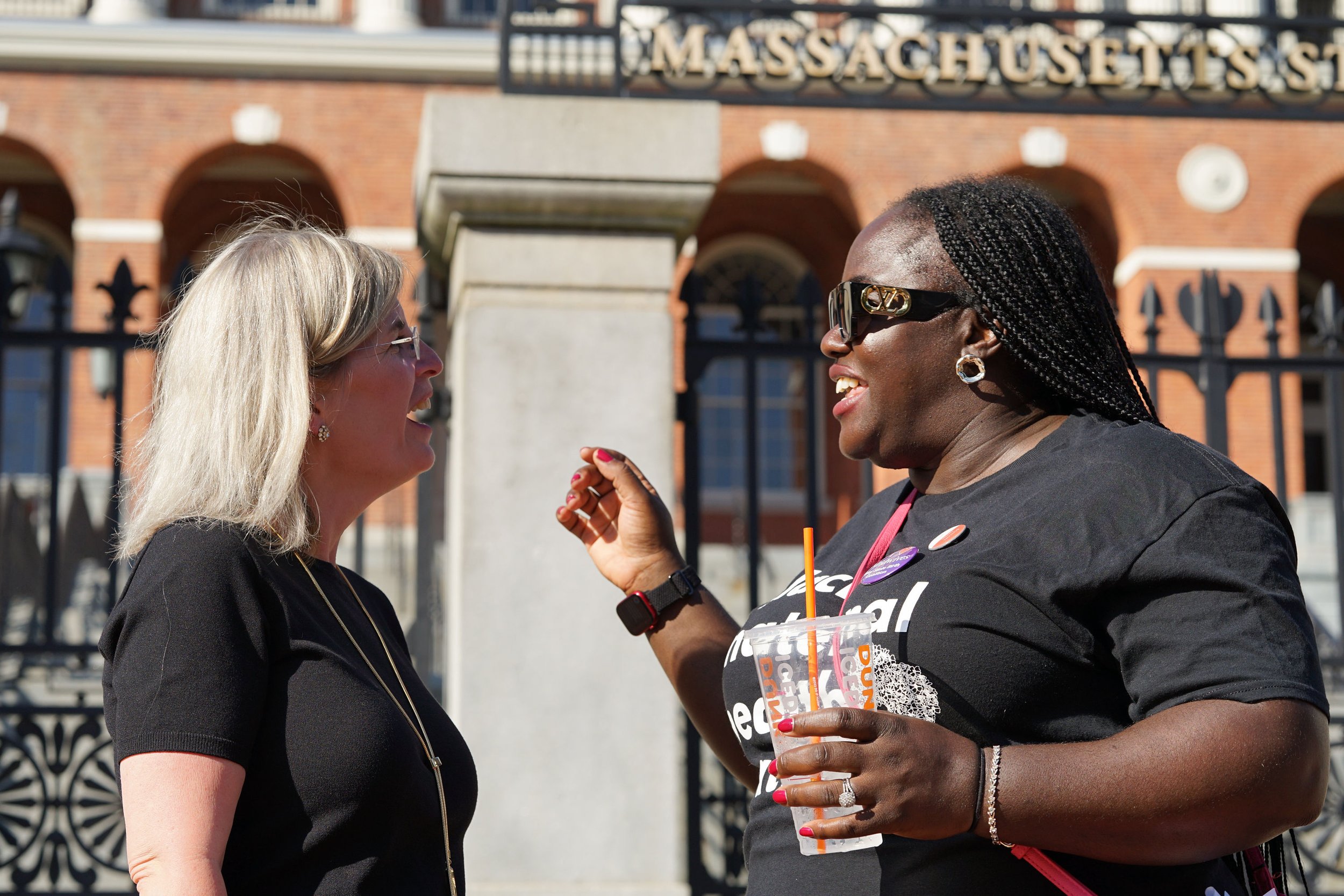
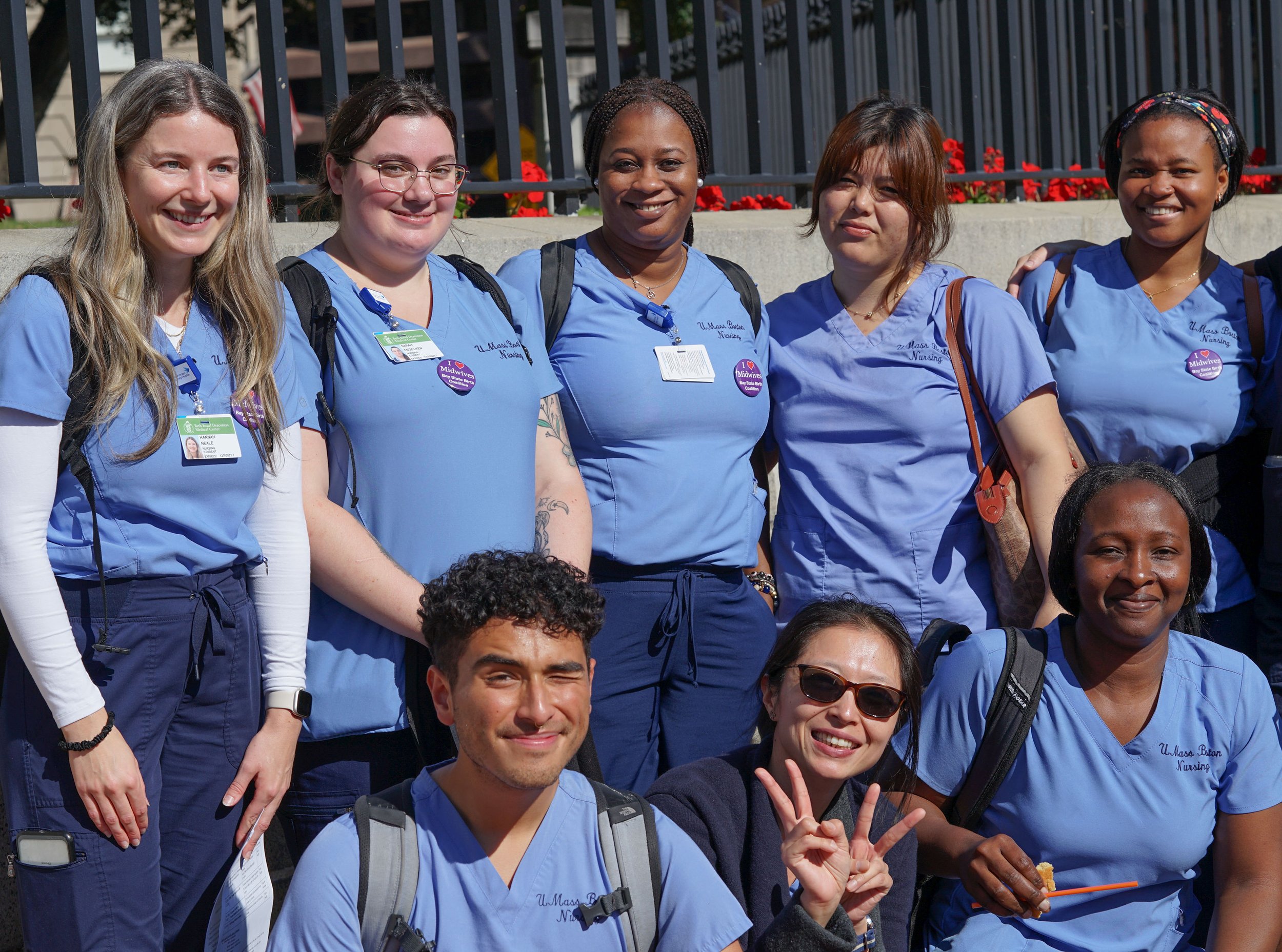
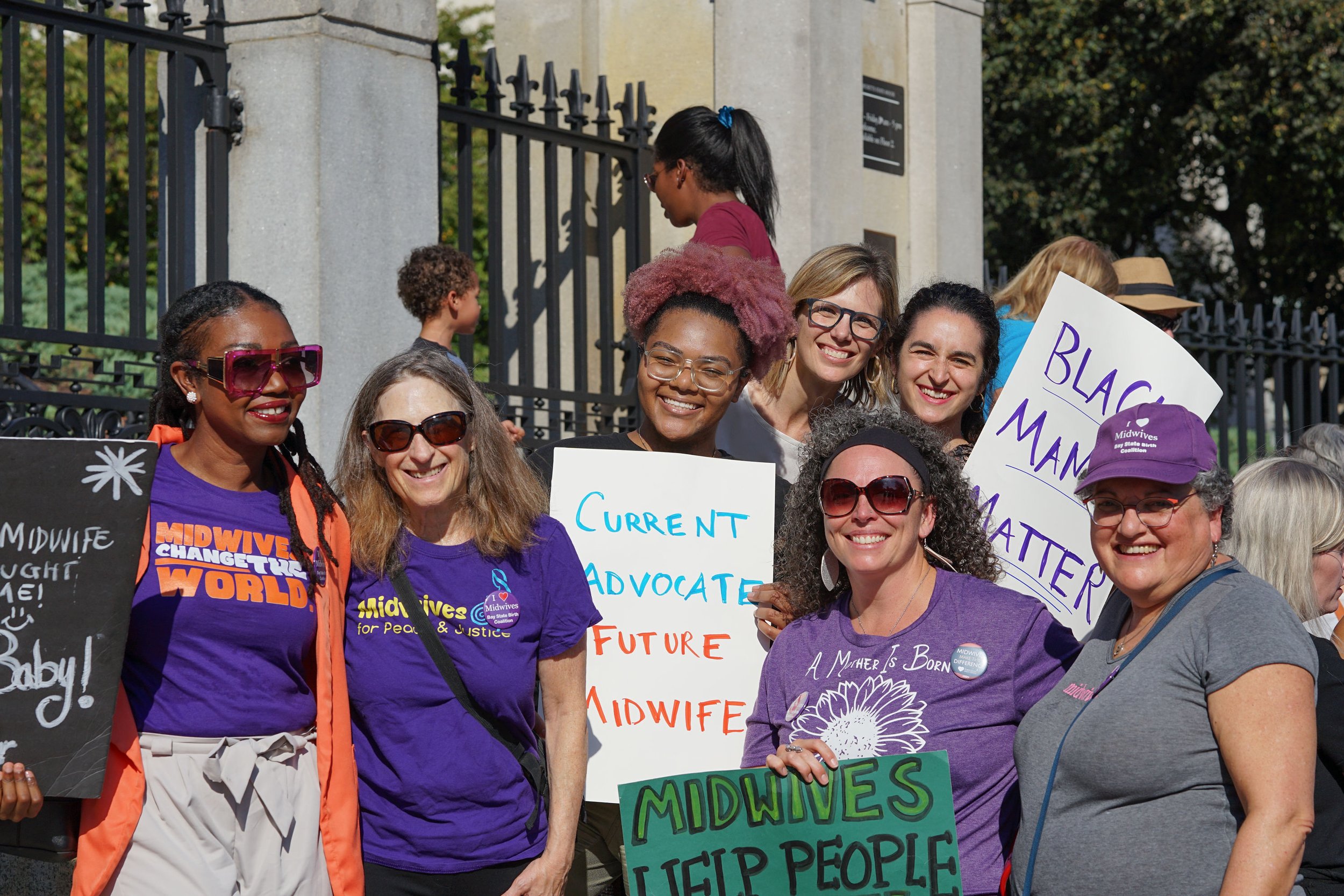
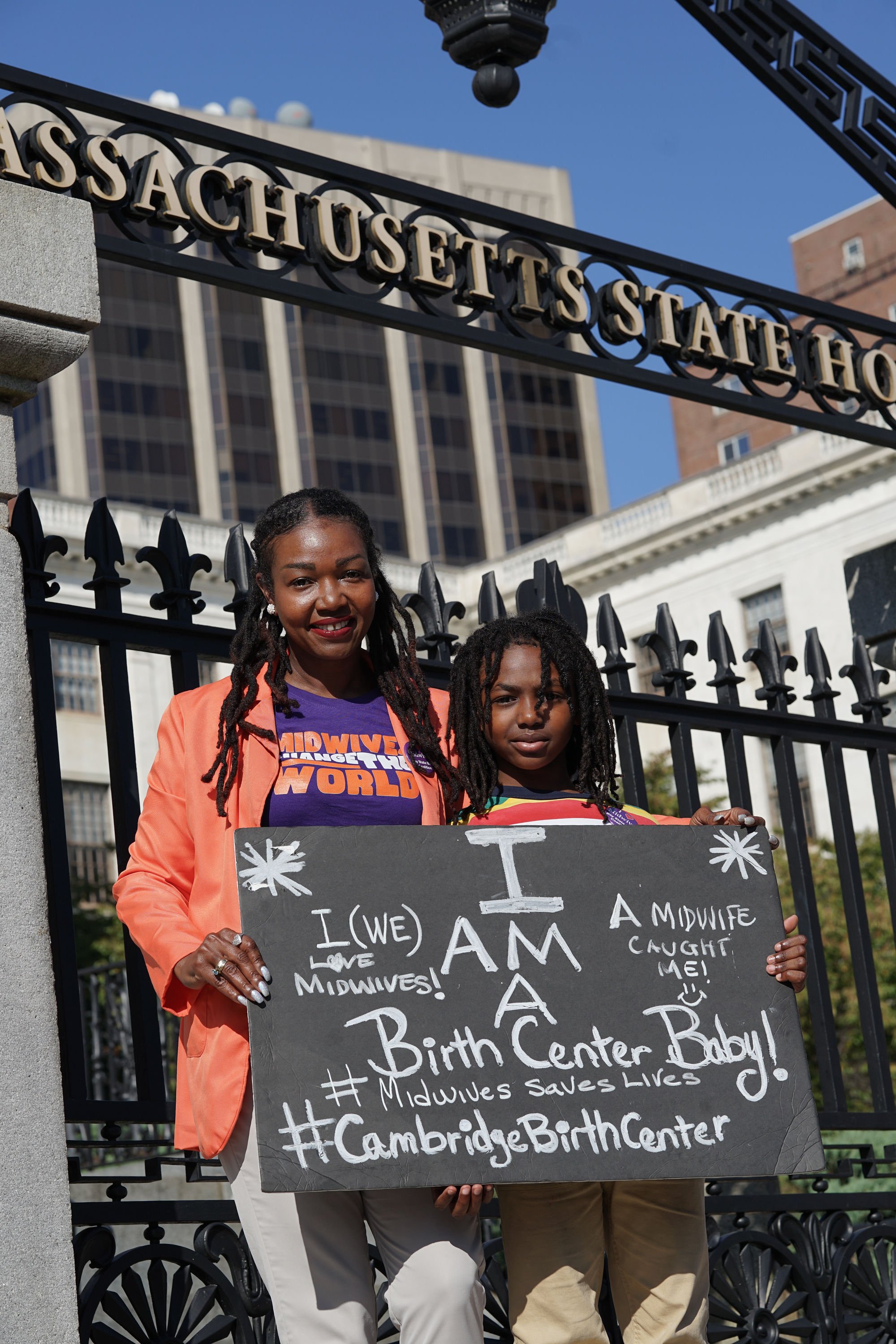
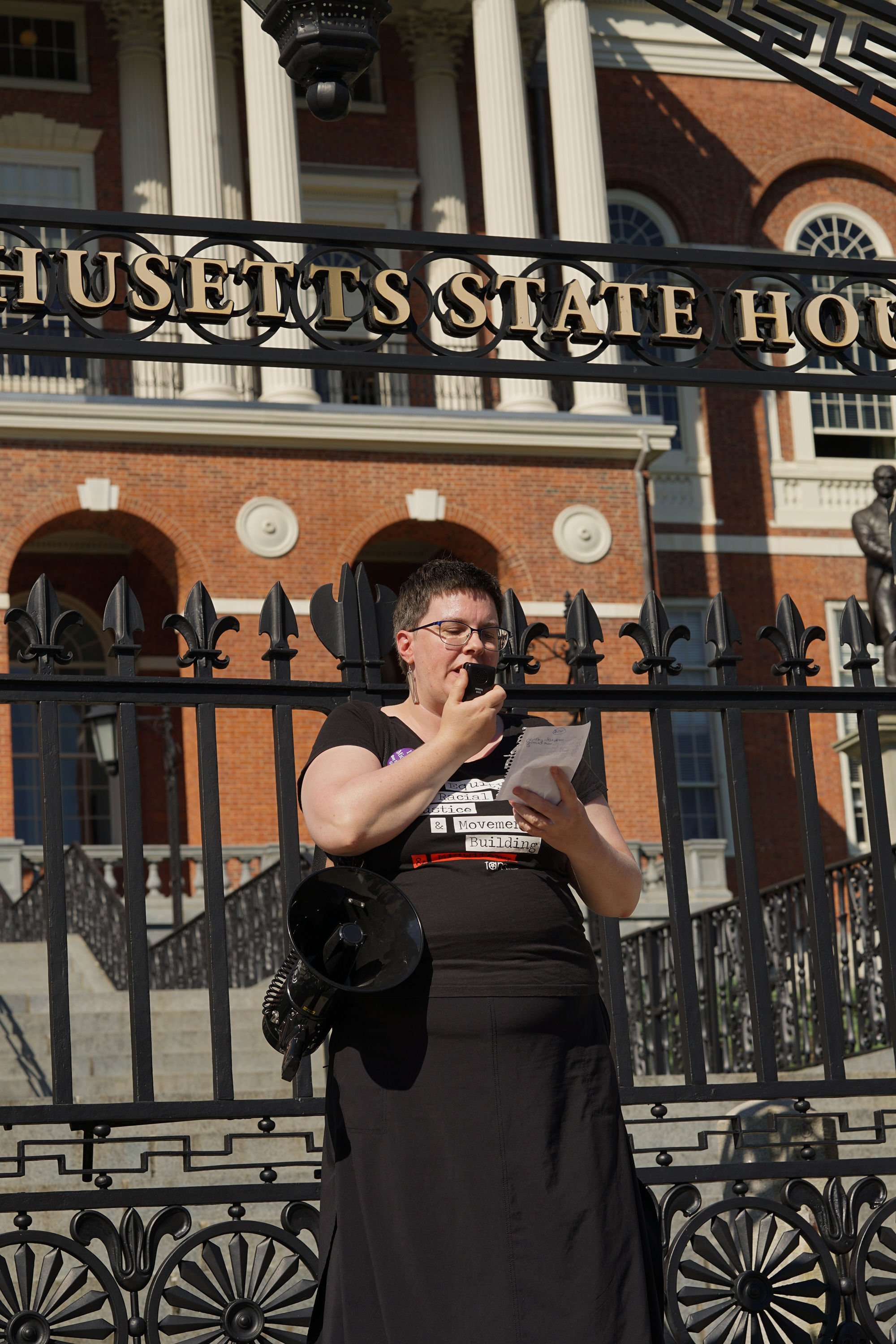
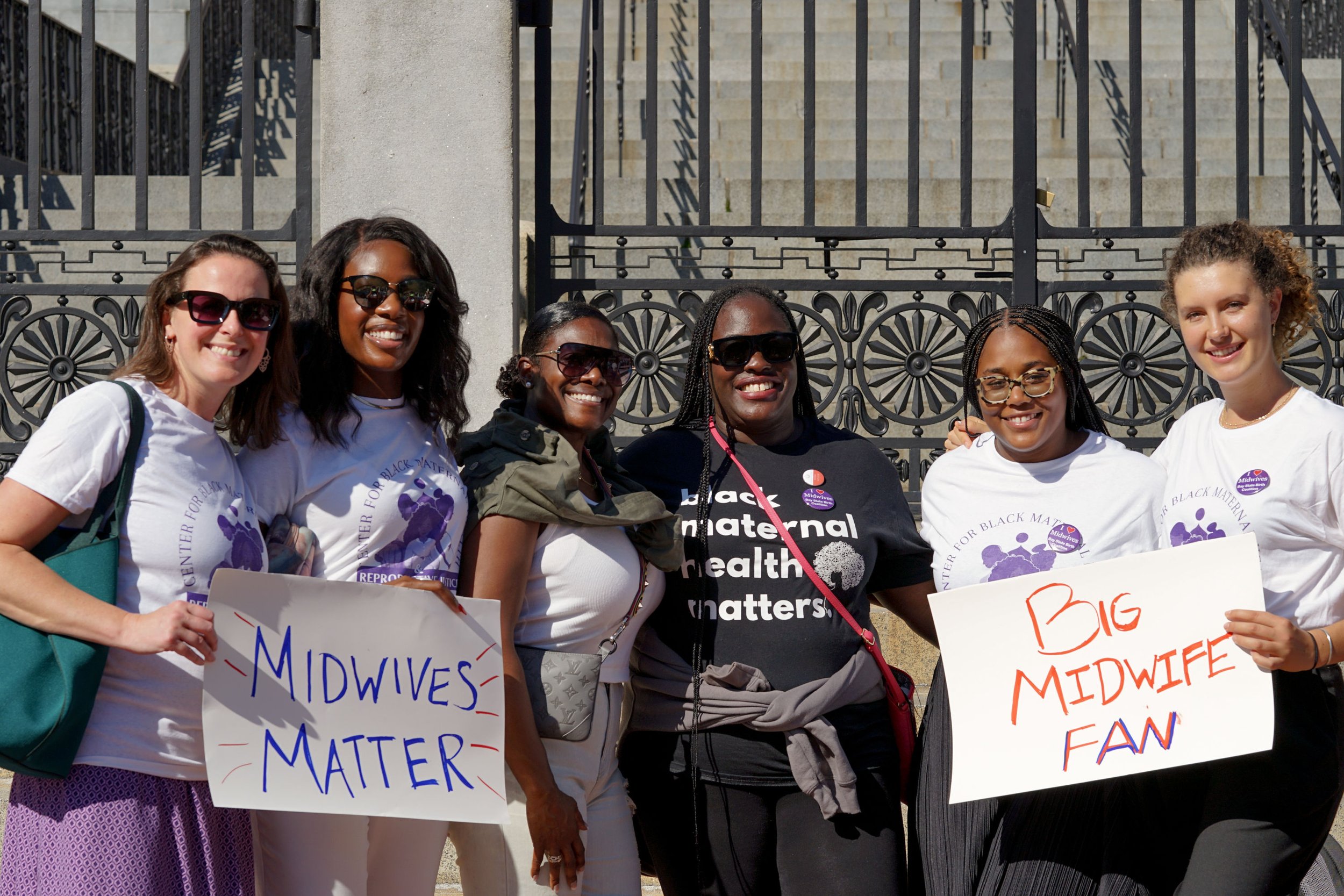
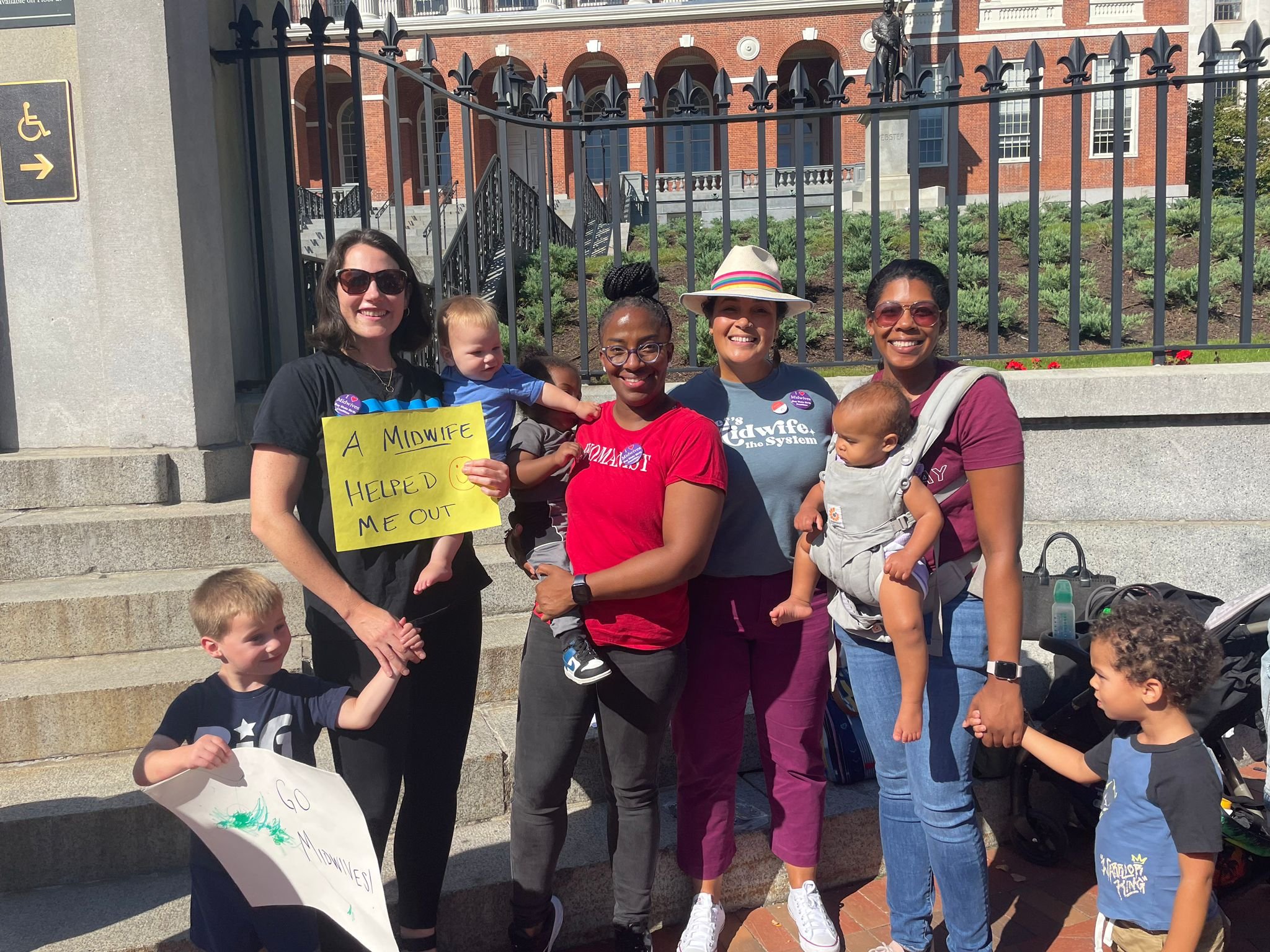
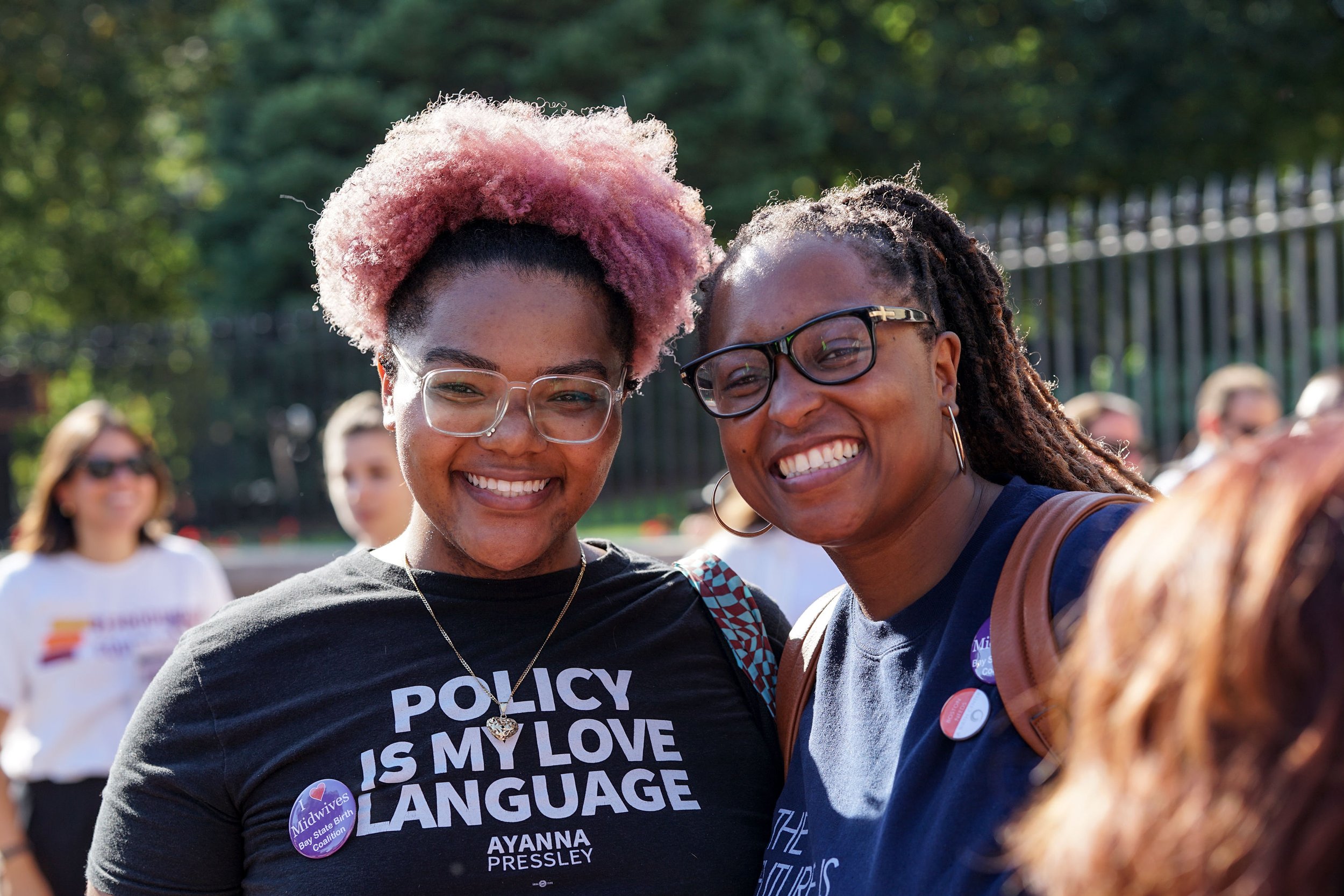
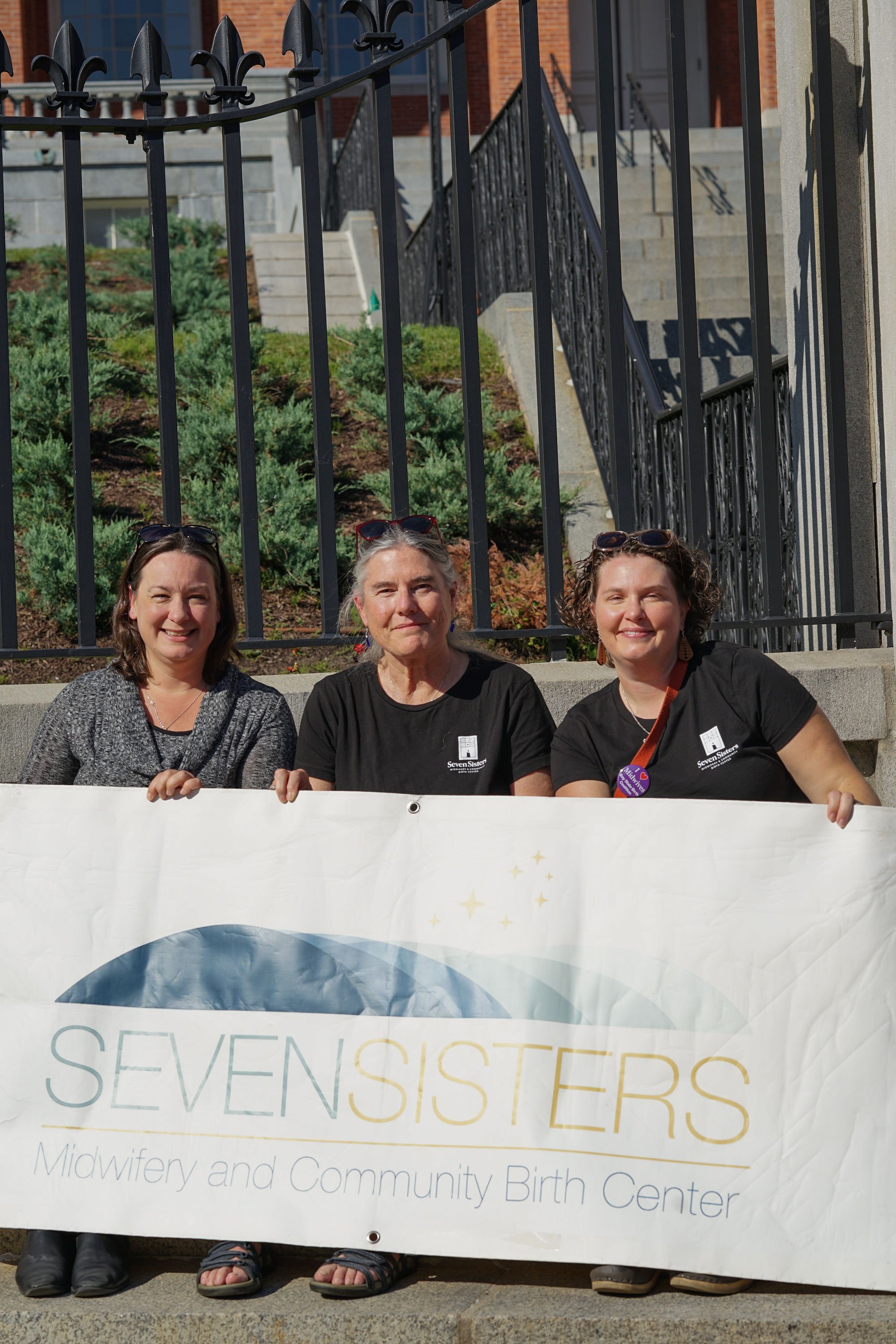
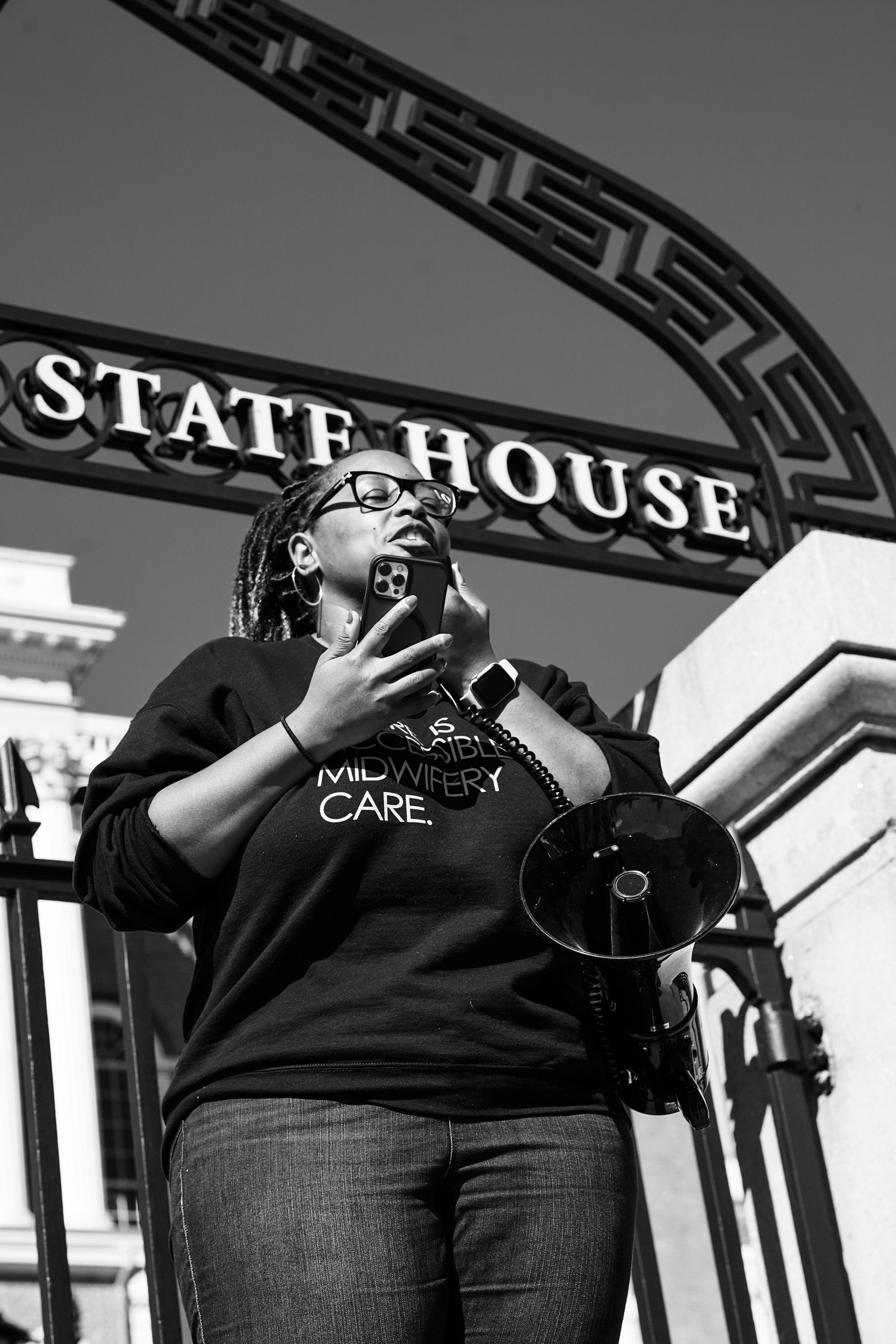
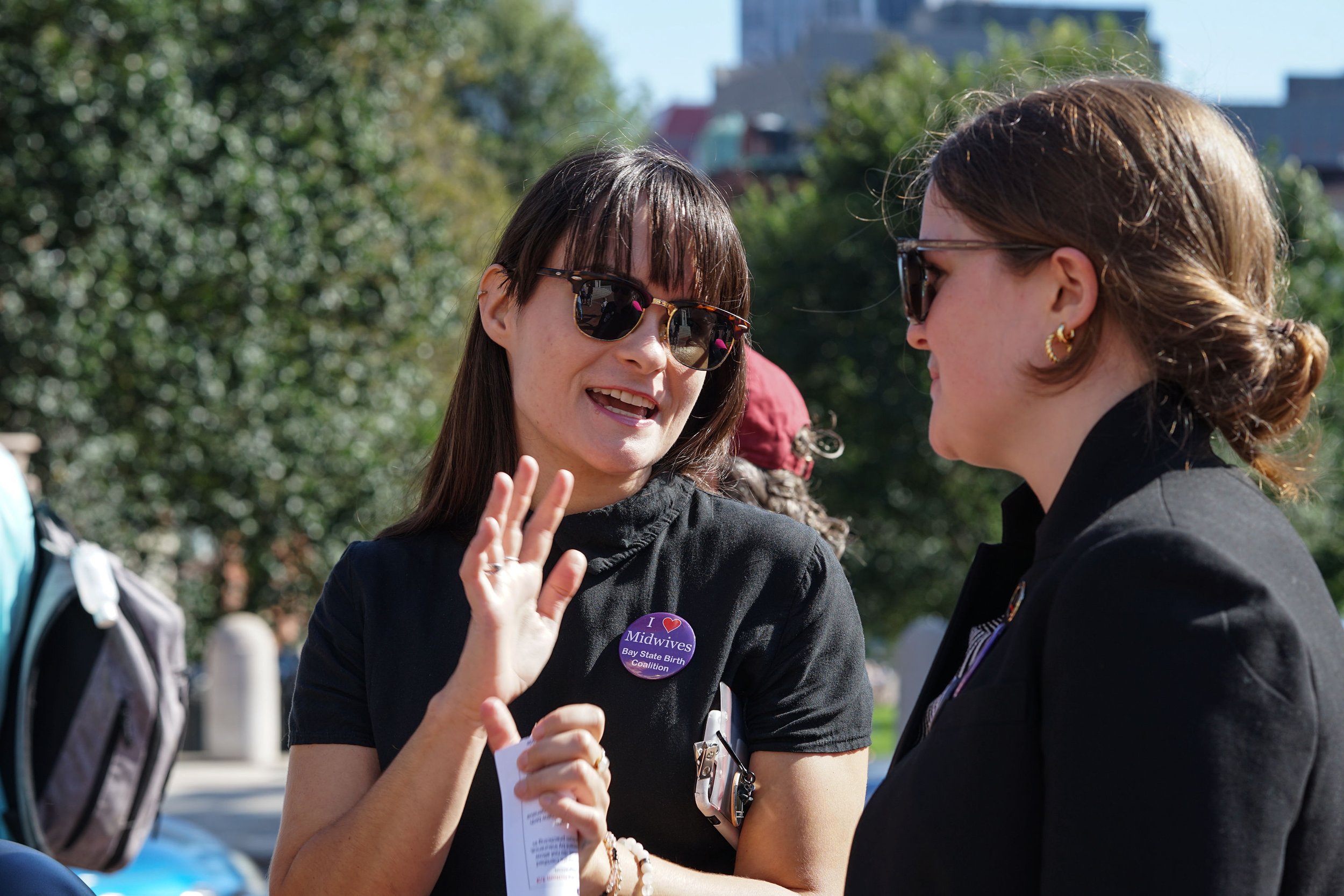
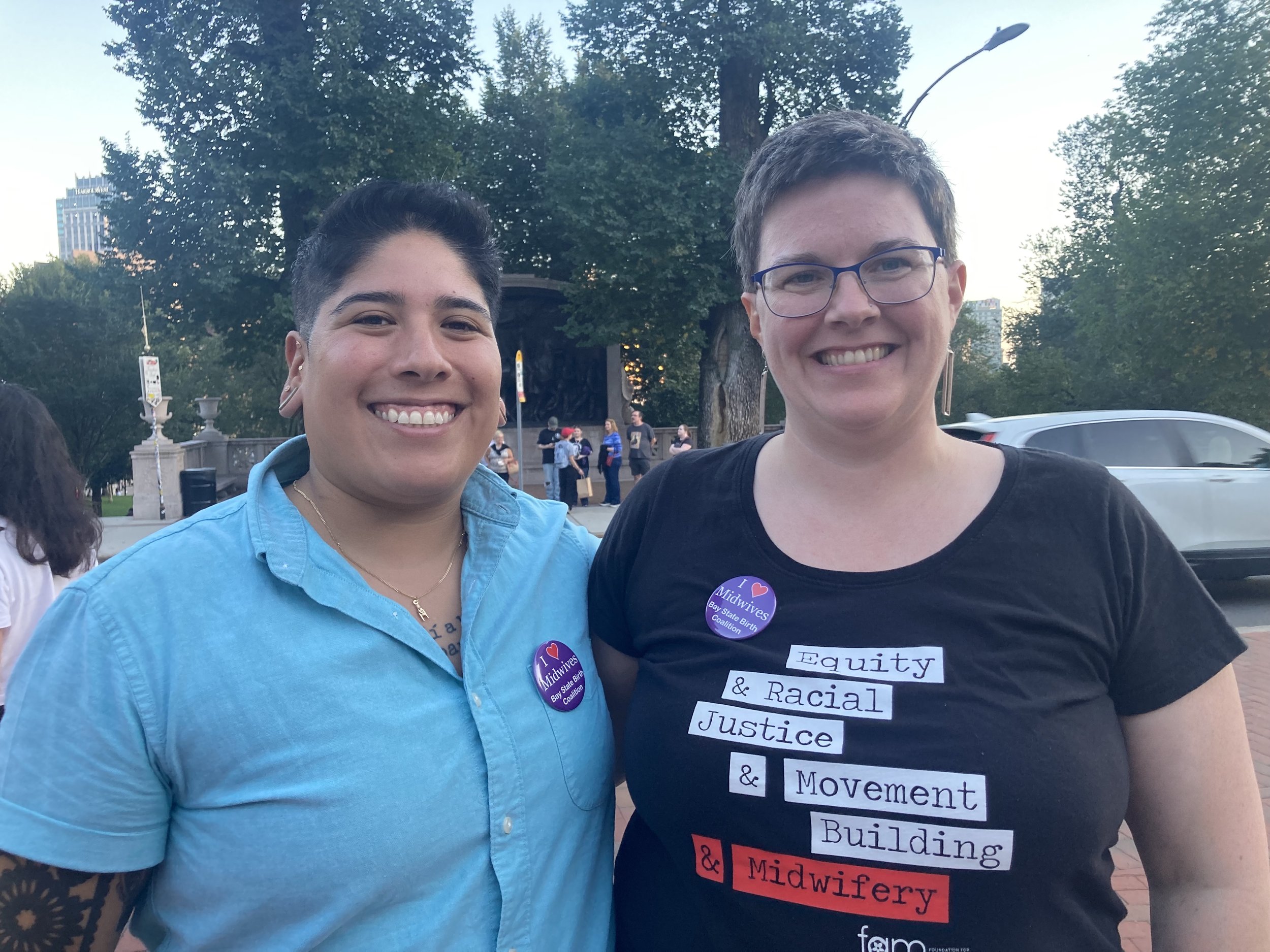
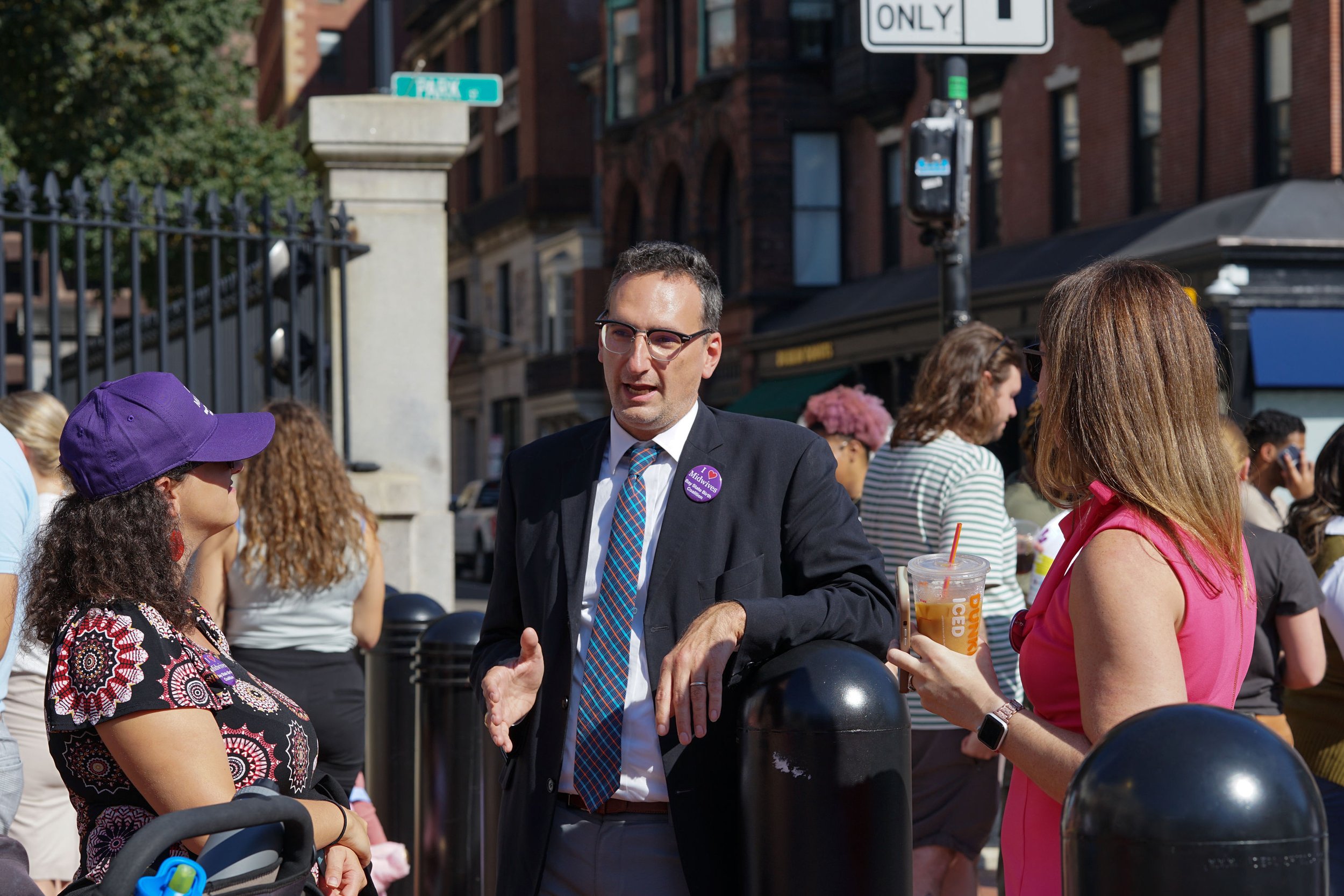
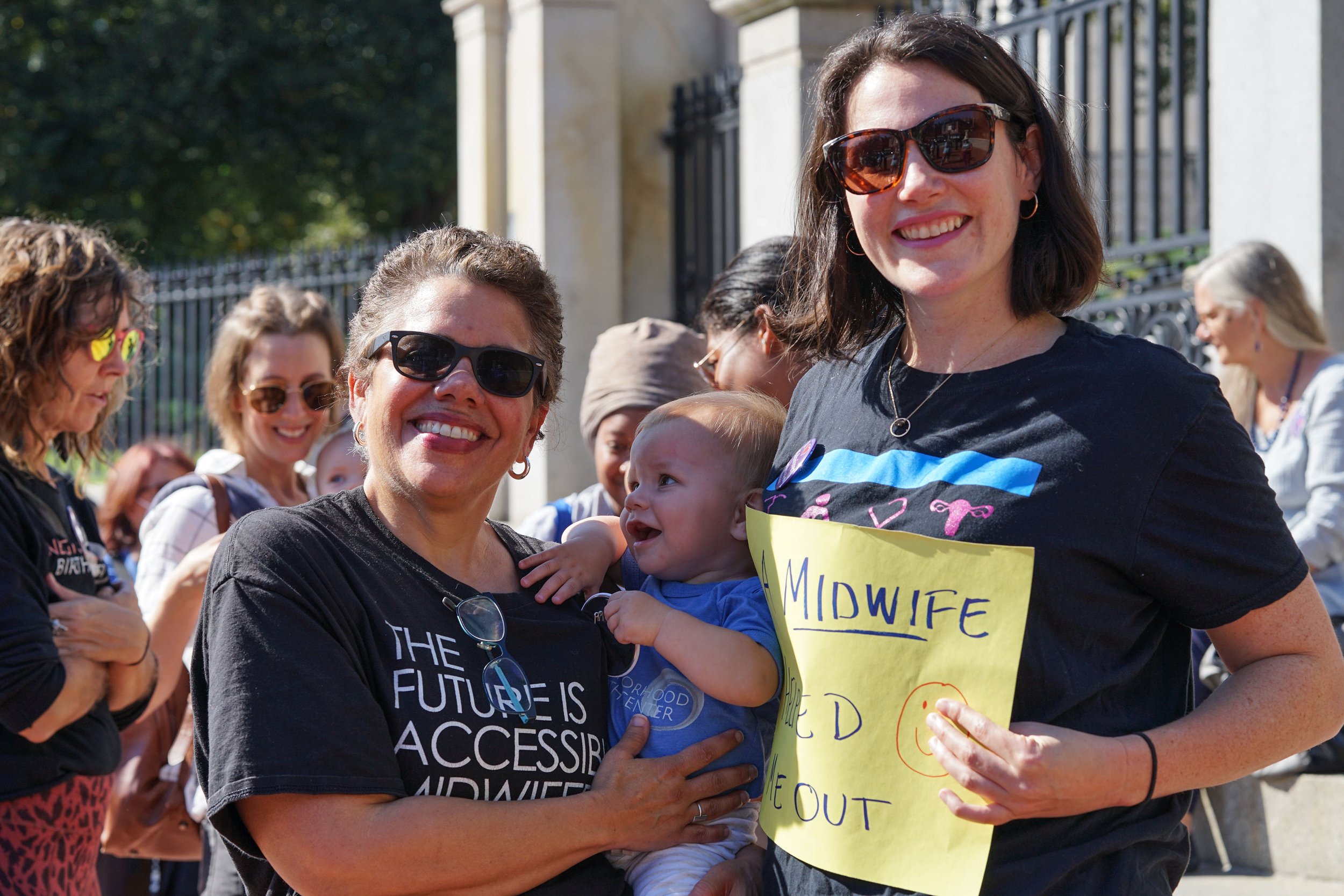
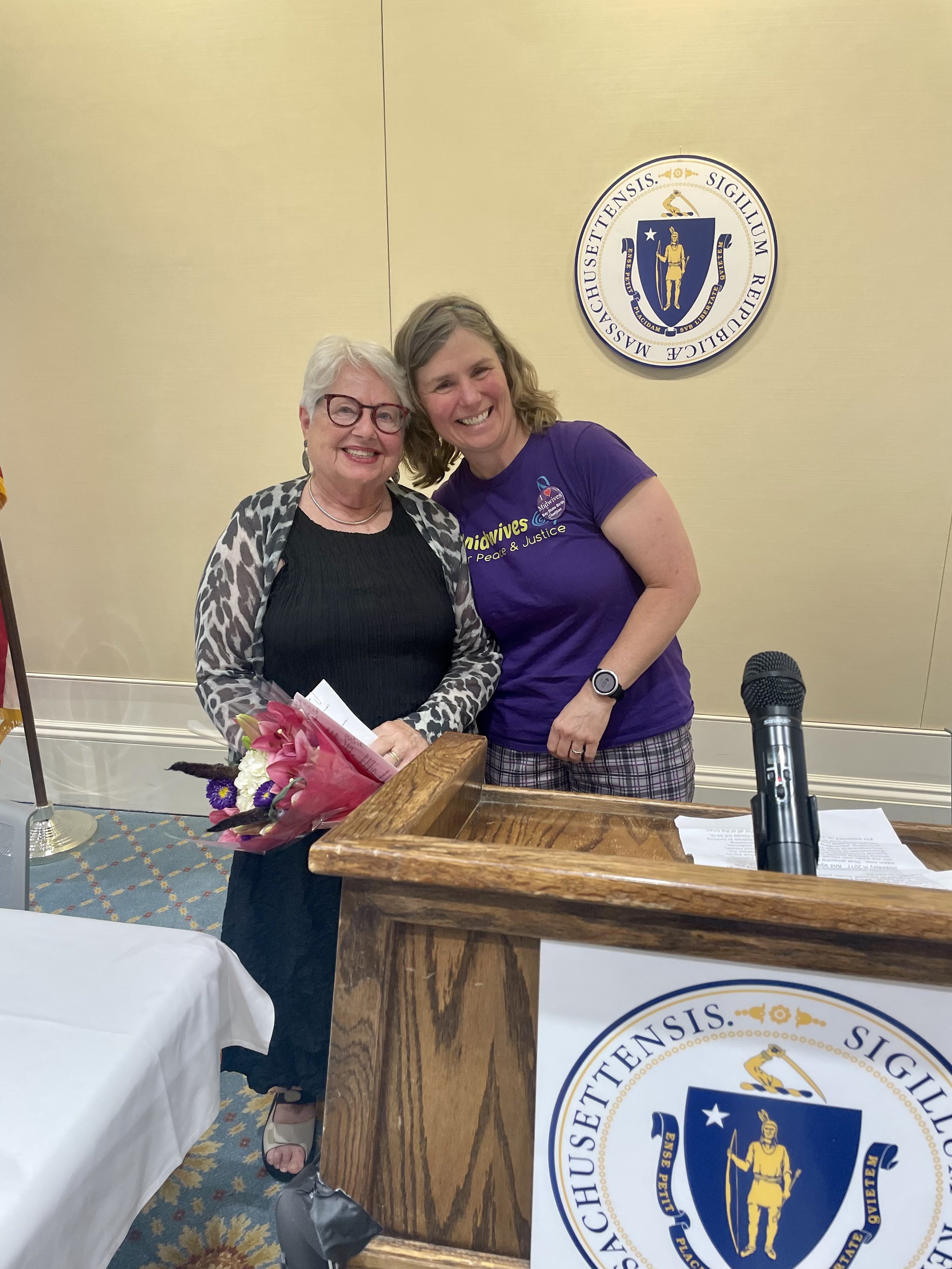
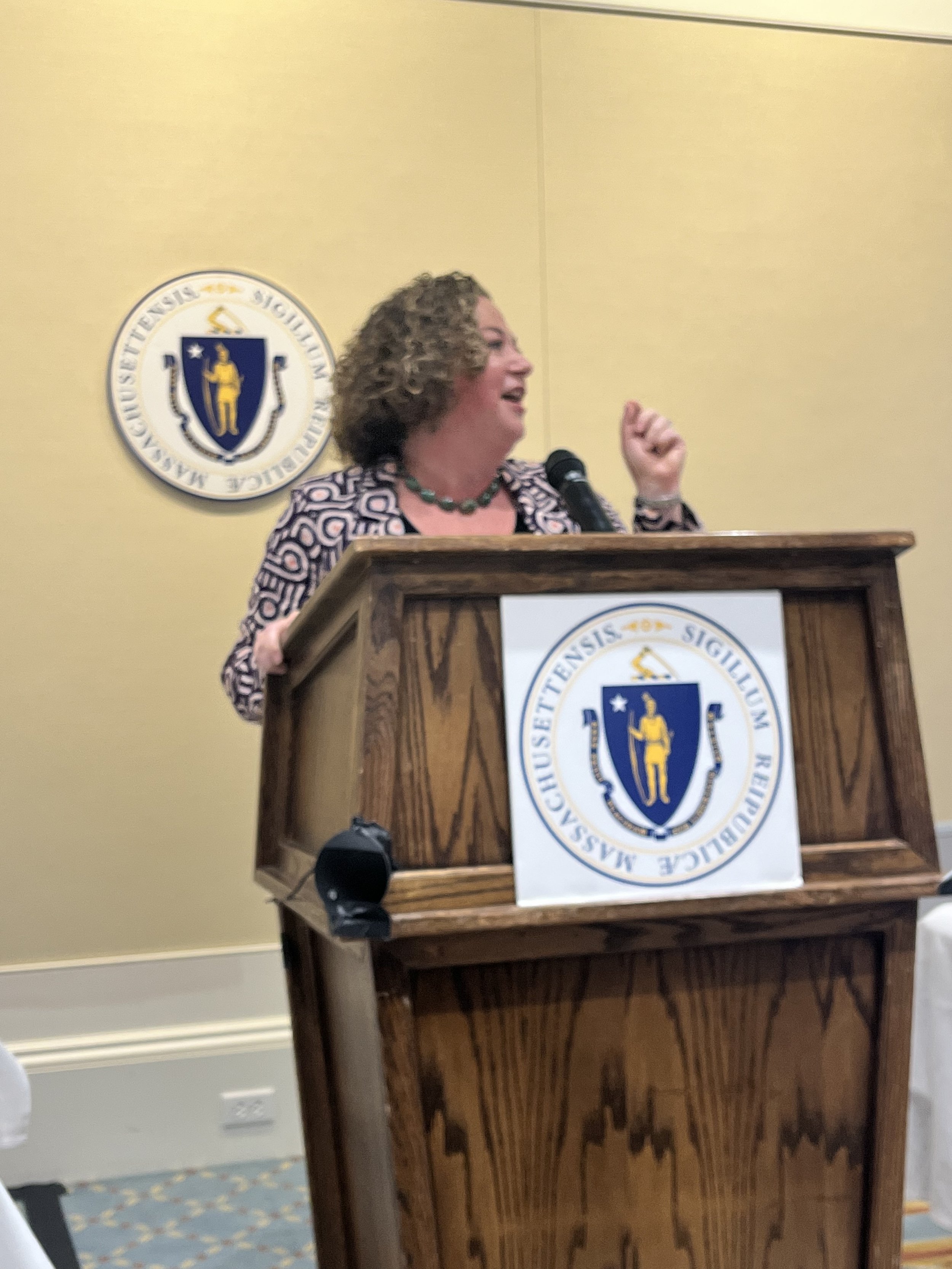
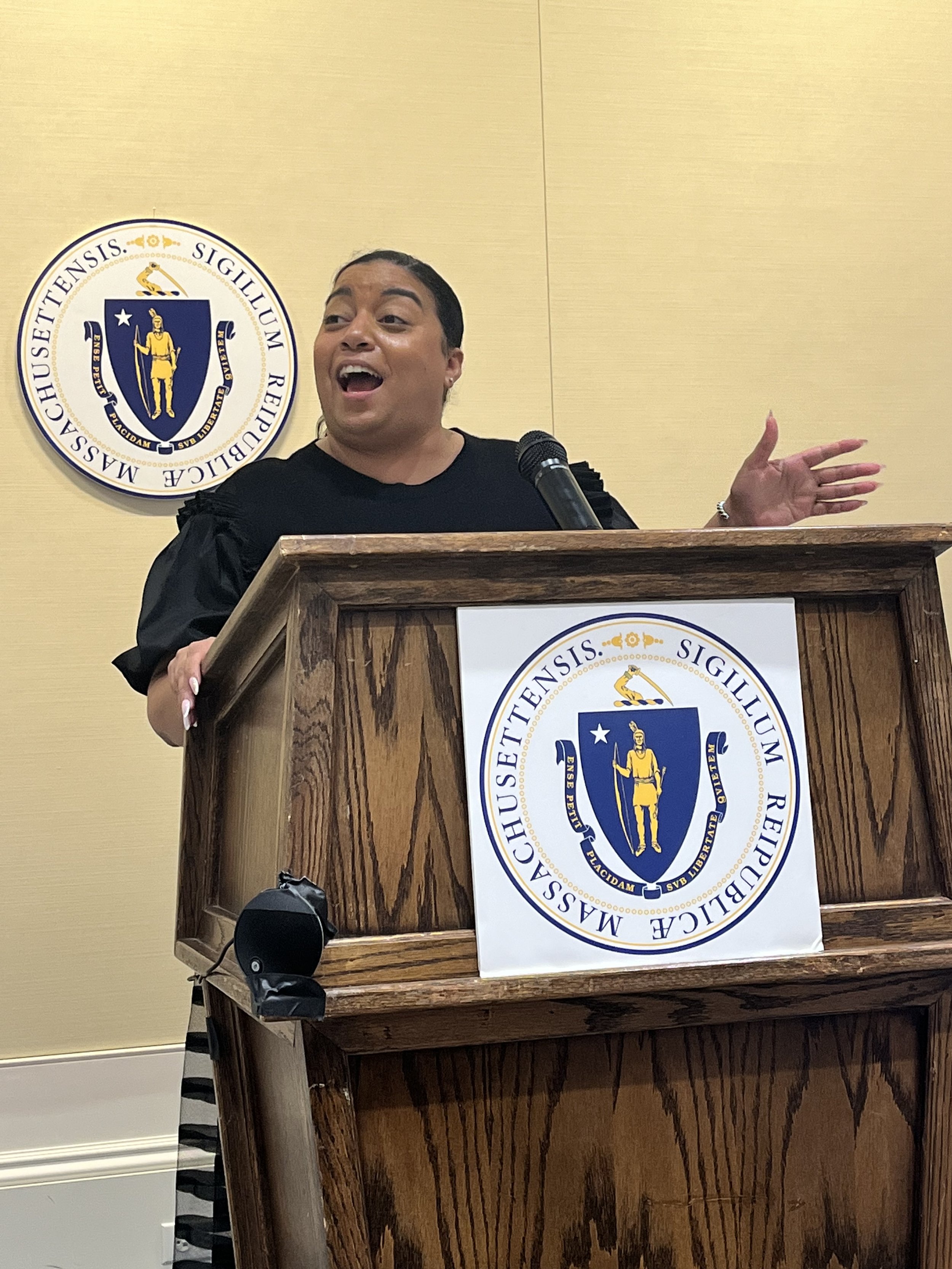
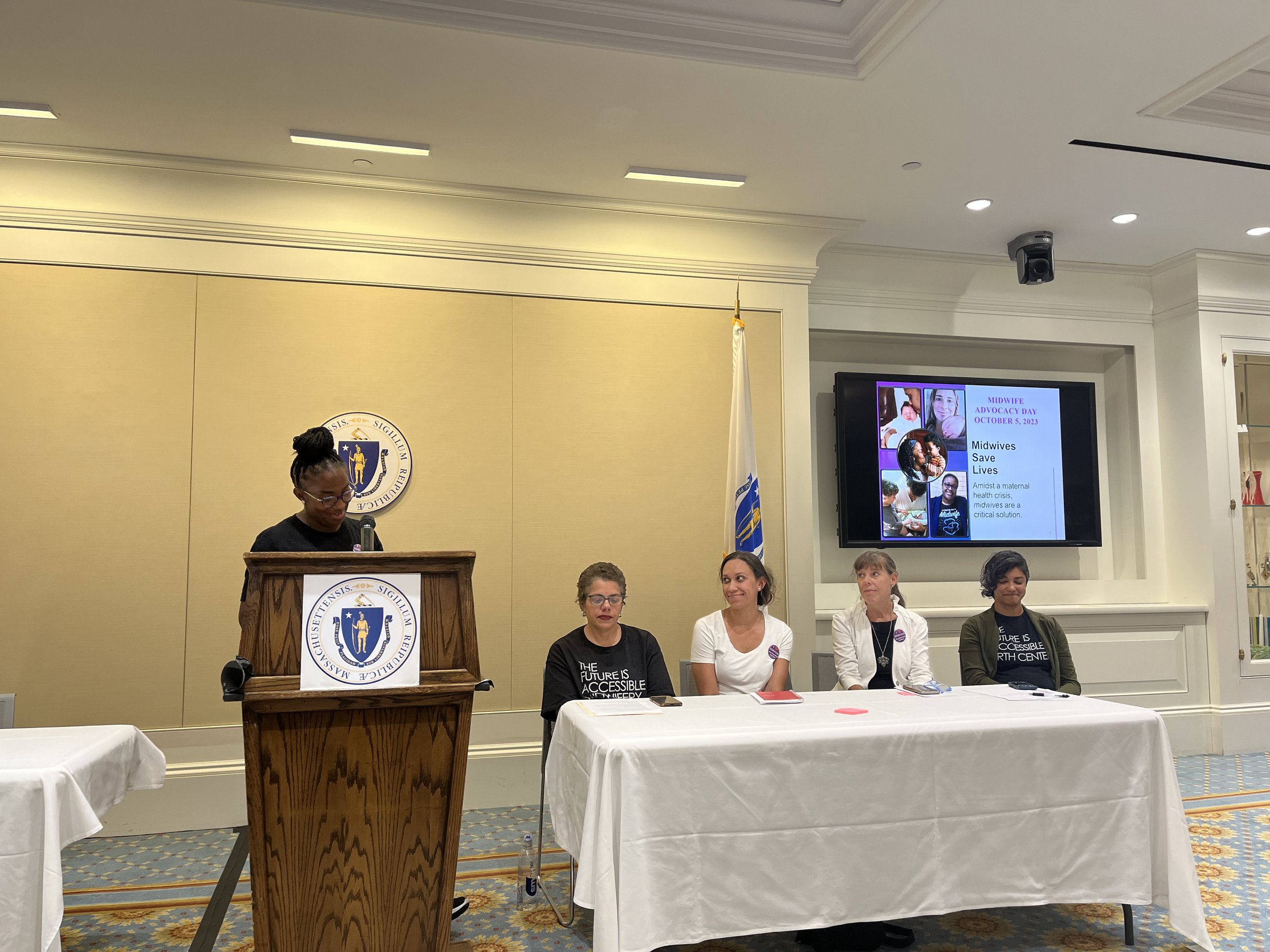
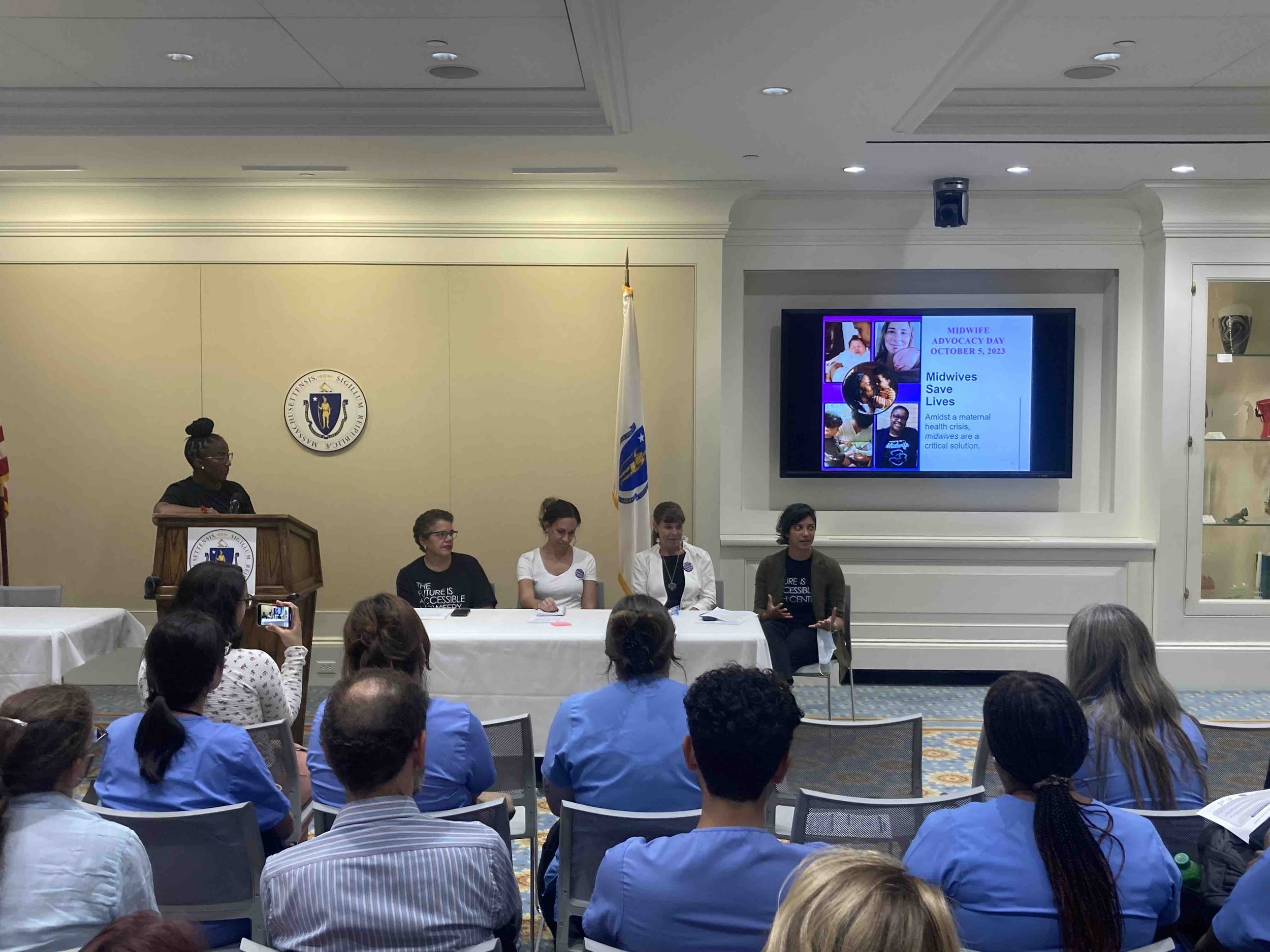
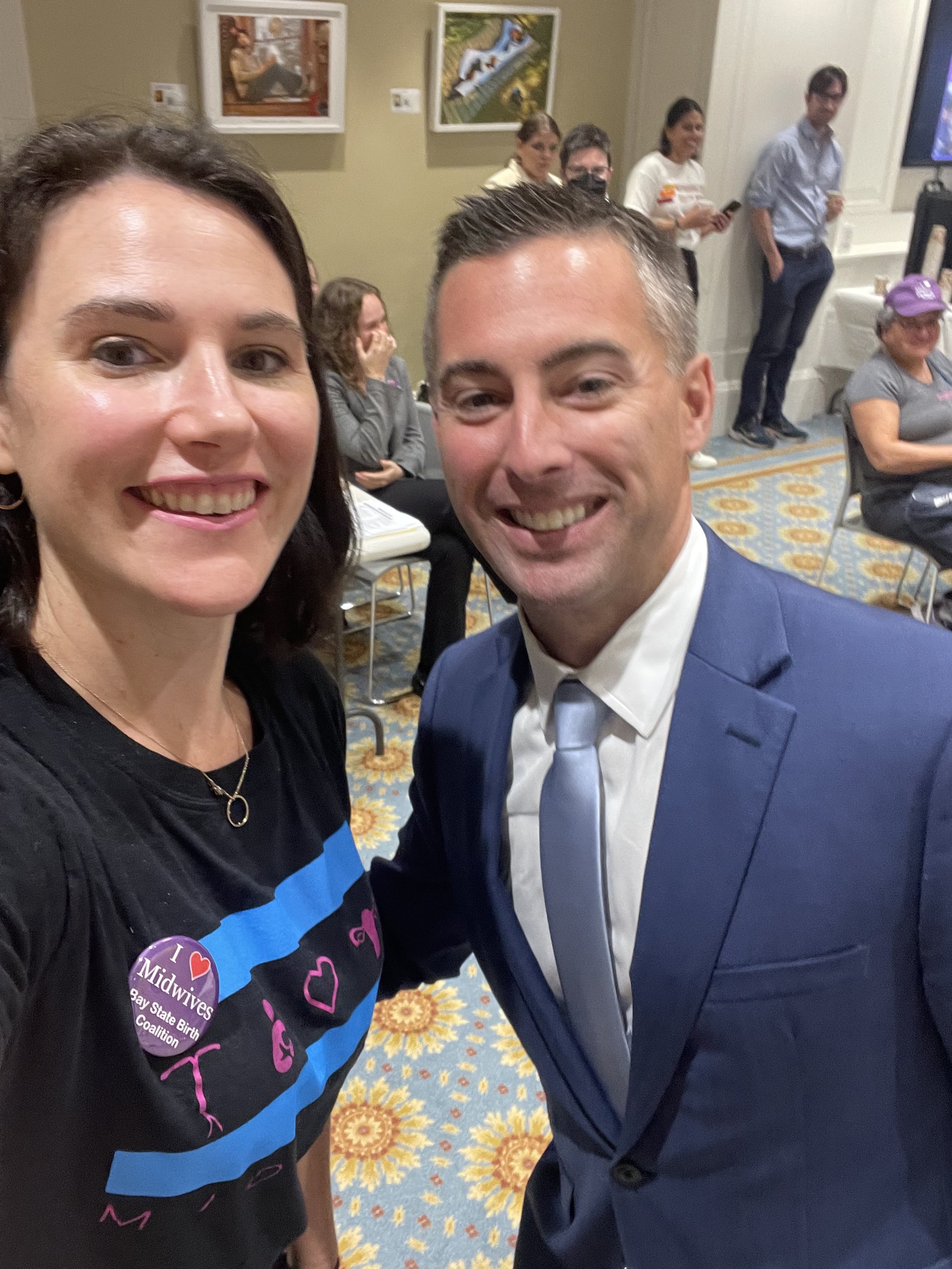
On October 5, maternal health and reproductive equity groups joined together at the State House to advocate for legislation to expand access to midwives in Massachusetts. Approximately one hundred parents, kids, midwives, nurses, students, community leaders, advocates, and legislators gathered for a powerful rally on the State House steps. Afterwards, supporters and lawmakers gathered inside the State House for a presentation and panel discussion on the value and importance of midwifery care.
Each rally speaker repeated the mantra of the day “Midwives Save Lives!” The rally emcee was Emily Anesta of Bay State Birth Coalition. Inside the State House after the rally, we heard from legislators and an expert panel moderated by Tiffany Vassell RN on pending midwifery legislation, and the importance of integrating midwifery care and birth options into the maternal care landscape in Massachusetts. Representative Kay Khan was presented with a lifetime achievement award from the Massachusetts Affiliate of the American College of Nurse Midwives.
Massachusetts currently ranks in the bottom third of states for midwife integration
Legislation highlighted included bills to integrate certified professional midwives into the health care system as 38 other states already do (H.2209/S.1457), update state birth center regulations (H.3616/S.1335), ensure pay parity for midwifery care (H.1069/S.607), and a comprehensive birthing justice package (S.1415). Read more about the midwifery agenda.
Bay State Birth Coalition was proud to co-host this event with Neighborhood Birth Center, ACNM Massachusetts, NACPM Massachusetts, Reproductive Equity Now, ACLU, MassNOW, Our Bodies Ourselves, Birth Equity & Justice Massachusetts, Center for Black Maternal Health and Reproductive Justice at Tufts Medical School, Mass PPD Fund, Mystic Valley Action for Reproductive Justice, and City of Boston Office of Women’s Advancement.
Some highlights!
Dr. Ndidiamaka Amutah-Onukagha Photo by Stefanie Belnavis | @thediahannproject
“We ask, no we demand, that midwives be fully integrated into the maternity care system,” — Dr. Ndidiamaka Amutah-Onukagha, founder of the Center for Black Maternal Health and Reproductive Justice at Tufts University; Commissioner on the Massachusetts Racial Inequities in Maternal Health Commission as she kicked off the rally on the State House Steps.
“We have a maternal health crisis in the United States. Legislators, advocates, and members of this coalition, we cannot stop advocating for the rights of mothers and our midwives,” — Rep. Chris Worrell (Boston).
Rep. Marjorie Decker with House colleagues Reps. Jennifer Armini, Sam Montaño, James Arena-DeRosa, and Lindsay Sabadosa behind her. Photo by Stefanie Belnavis | @thediahannproject
“Birthing people do better with midwives… Today, I stand here with you. I stand here with my amazing colleagues to know that we actually have the information. We have the legislation. We have the tools to create better, safer outcomes for all of our families in Massachusetts,” — House Public Health Committee Chair Marjorie Decker (Cambridge)
“Massachusetts likes to talk about being the first and the best, but that’s not the case right now. We need all hands on deck,” — Senator Liz Miranda (Boston)
Rep. Manny Cruz (Salem) held his daughter Ivy as he shared his personal story of the midwifery care his family received at the now-closed North Shore Birth Center, and thanked his family’s midwife, Esther Hausman, who was in attendance at the rally. Rep. Cruz said “In that moment when I heard the ultrasound, I had to make them stop because I didn’t know what I was hearing. And I turned into a big sobbing mess when they told me that it was her heartbeat.”
“It’s an issue that affects every family. This is about your freedom, your choice, as a family, as a mother, to decide how you want to approach this,” — Senator Brendan Crighton (Lynn)
Senator Becca Rausch shared “In my first term in the Senate, we passed this bill on midwifery licensure on the Senate floor, unanimously. And there is no reason for us to not do that again right now in a moment where the health statistics on maternity care, and birth care, and outcomes are scary at best.”
Rep. Manny Cruz holding his daughter as he talks about his family’s experience with midwifery care at North Shore Birth Center. Photo by Stefanie Belnavis | @thediahannproject
"I wanted that individualized care. I wanted it to be evidence based care. I wanted to be looked at as more than a statistic, especially as an indigenous person. We’re facing huge disparities as well when it comes to outcomes as birthing people. I didn’t want to be part of those statistics, and I felt safer at home. I felt safer with a CPM [Certified Professional Midwife],” — Rachael Lovely, midwifery client and member of the Mashpee Wampanoag tribe, on her choice to seek home birth midwifery care.
Dannette Siegel, mother, midwifery client, doula, and activist, described the life-transforming midwifery care she received at the now-closed North Shore Birth Center: “That choice for empowering, holistic, midwifery-led care was taken away from my community when the last remaining birth center in Eastern Massachusetts was closed by Beth Israel Lahey Health last December… It’s shameful that Massachusetts does not have the policies and infrastructure in place for midwives to offer care that is accessible to everyone and sustainable, but it’s something we can change starting now.”
Nashira Baril MPH shared the challenges she faces in opening Neighborhood Birth Center (Boston’s first freestanding birth center): “Unless the regulatory and policy context here in Massachusetts changes, we will operate in the red, and we will be vulnerable to closure like the other birth centers, and that we cannot stand for.”
Midwives and an OBGYN weighed on the importance of enacting policies to integrate midwifery care and birth options in Massachusetts:
“Let’s elevate midwifery so it is part of the foundational fabric of our health system, which will not only impact outcomes for the people who meet and see midwives and are cared for by midwives, but could also improve the outcomes that are delivered by physicians like me when we work next to a midwife,” said Dr. Pooja Mehta, MD, OB-GYN.
“This is not about information. We know and have for hundreds of years, the value of midwifery care. It’s really now about political will to change the system and increase access to midwives… The people of Massachusetts want access to midwives. They want access to the care that we provide, and the outcomes that we deliver on. They also want access to community based birth. They want to have choices,” said Susan Hernandez, CNM, Massachusetts Affiliate American College of Nurse Midwives, Commission on Racial Inequities in Maternal Health.
“I just would love for Massachusetts to catch up to the other 38 other states and integrate CPMs into the health care system, for the collaborative care, for the equitable access,” said Ann Whitman, CPM, Massachusetts Chapter of National Association of Certified Professional Midwives.
“Clients deserve the full range of birth options,” said Melissa Nelson CNM (Mass General Hospital).
Midwife Advocacy Day comes after a recent Massachusetts Department of Public Health report revealed that rates of severe maternal morbidity in Massachusetts nearly doubled over a decade, disproportionately impacting Black mothers in the state. Four maternity units and two birth centers have also closed across Massachusetts since 2020, reducing birth options and access to care.
“Midwives are true change agents and provide essential care services that could mean the difference between life and death for birthing people,” said Dr. Ndidiamaka Amutah-Onukagha, Julia A. Okoro Professor of Black Maternal Health in the Department of Public Health and Community Medicine at Tufts University School of Medicine, and founder of the Center for Black Maternal Health and Reproductive Justice. She continued, “Midwives need to be fully incorporated into the maternity care system. With barriers lifted restricting autonomous practice, more funding for education and training, and equitable insurance and Medicaid reimbursement as part of policy, we’ll see the tides change and will avert maternal deaths in a meaningful way, for the first time in decades.”
A midwife is a clinical health care provider with a low-tech, high-touch approach to pregnancy and birth. The midwifery care model centers on physiologic birth, holistic care, and informed consent, and clinical care can be provided in birth centers, home, and hospitals. Evidence shows that midwifery care can help eliminate racial disparities in maternal health outcomes by improving patient autonomy and satisfaction. Midwifery care is proven to lead to lower rates of cesarean section and preterm birth and low birth weight babies, and reduces healthcare costs.
Despite the proven benefits of midwifery care, Massachusetts currently ranks in the bottom third of states for midwife integration nationwide. State law does not integrate or license Certified Professional Midwives (CPMs), does not allow for CPMs to be reimbursed by insurance, and excludes CPMs from practicing in birth centers. Outdated state birth center regulations also make opening new birth centers more complex and expensive than what national regulatory agencies require. Massachusetts is currently home to only one birth center, out of 400 nationwide.
Advocates are urging the Massachusetts Legislature to pass the following bills to expand access to midwifery care in the state:
An Act promoting access to midwifery care and out-of-hospital birth options (H.2209/S.1457), sponsored by Sen. Becca Rausch, Rep. Kay Khan, and Rep. Brandy Fluker Oakley, creates a pathway to licensure for certified professional midwives and makes their care reimbursable by Medicaid/MassHealth
An Act updating the regulations governing licensed birth centers in Massachusetts (H.3616/S.1335), sponsored by Sen. Jo Comerford, Rep. Manny Cruz, and Rep. Chynah Tyler, addresses onerous and outdated barriers to the creation of free-standing birth centers
An Act to increase access to nurse-midwifery services (H.1069/S.607), sponsored by Rep. Kay Khan and Sen. Brendan Crighton ensures insurance reimbursement parity for certified nurse midwives
An Act relative to birthing justice in the Commonwealth (S.1415), sponsored by Sen. Liz Miranda, includes language from the above-referenced midwifery and birth center bills as well as additional urgently-needed policies for optimal maternity care and to address long standing racial inequities in maternal health care
Midwife Advocacy Day was hosted by the Neighborhood Birth Center, Bay State Birth Coalition, ACNM Massachusetts, NACPM Massachusetts, Reproductive Equity Now, MassNOW, ACLU of Massachusetts, Our Bodies Ourselves, Mystic Valley Action for Reproductive Justice, City of Boston Office of Women’s Advancement, Birth Equity & Justice Massachusetts, Center for Black Maternal Health and Reproductive Justice at Tufts Medical School, and the Mass. PPD Fund.
“People in Massachusetts want and deserve access to midwifery care and birth centers. It’s time for legislative action to integrate midwives into our health care system,” said Emily Anesta, Co-Founder of the Bay State Birth Coalition.
“At this moment of crisis for reproductive health care nationwide, Massachusetts must lead in improving maternal health outcomes and eliminating racial disparities for birthing people. Midwives are absolutely critical to addressing the Black maternal health crisis in our state, which new data shows is only becoming more dire,” said Rebecca Hart Holder, President of Reproductive Equity Now. “These pieces of legislation will help improve access to midwifery care in our Commonwealth, get rid of onerous financial and administrative burdens to the creation of freestanding birth centers, and help Massachusetts catch up in its integration of Certified Professional Midwives into our maternal health system. The Legislature should move to pass these bills immediately because reproductive equity cannot wait.”
“Midwives are essential to bodily autonomy,” said Traci Griffith, Racial Justice Program Director at ACLU of Massachusetts. “By ensuring all pregnant people have a choice in their health care alternatives, Massachusetts can improve maternal and infant health outcomes and reduce racial inequities. Midwives provide alternative care that is affordable and accessible, particularly for Black and Indigenous women who face disproportionately high rates of maternal death. Access to midwives can lead to better outcomes for all.”
“Midwives provide full spectrum, empowering, and holistic healthcare. Integrating midwives into our healthcare system is an essential step to ending the maternal health crisis and will result in better outcomes for all,” said Carina Lopez, Interim Executive Director of the Mayor’s Office of Women’s Advancement. “MOWA is committed to supporting all aspects of women’s health and overall well-being by focusing on initiatives that impact women throughout their lives and during pregnancy and birth, especially for those in communities that are underrepresented."
“As an organization working to address postpartum depression and other Perinatal Mood and Anxiety Disorders (PMADs), I can’t tell you how often we hear about scary, unsupported, and traumatic birth experiences and the aftermath for parents’ mental health and wellbeing. We need to rethink how we treat parents in Massachusetts, starting with birth, and we’ll see better outcomes all around. Midwives have it right! We’re proud to stand with them today,” said Jessie Colbert, Executive Director of Mass. PPD Fund.
"Increasing access to midwifery care is critical to reach racial equity in maternal health," said Rachel Roth and Alan Linov, leaders of Mystic Valley Action for Reproductive Justice. “Massachusetts must do better to ensure that everyone who is pregnant can get the care they need where they live and end the two-tier system of care where only people who can afford to pay out of pocket can benefit from the full range of proven healthcare providers. These bills will bring our state closer to achieving these goals."

